#this has been a commentary since like 2013 but its just so strange to me that american girl consistent has boring white girl protagonists
Explore tagged Tumblr posts
Text
if i had a nickel for everytime an american girl doll had an asian best friend character who had an arc where they turned into an antagonist of some kind id have like 5 which is ?
#im binging the goty movies hi#most notably referring to toulane and sonali#this has been a commentary since like 2013 but its just so strange to me that american girl consistent has boring white girl protagonists#with side character friends who have significantly more interesting and compelling storylines happening#i.e julie albright's main tackle is being a tomboy in the 70s#<- and then her best friend ivy ling's storyline consists of being a chinese immigrant living in 70s California and like!#one of those plots seems more important here I'll be honest !#i think the main thing is these stories are less designed for those who are experiencing these things and more so designed to spoonfeed to#girls who are better off#i.e in kit's story she's friends with a girl named county during the great depression#and county's big Reveal is that she's been pretending to be a boy so she can work to survive#and like im sorry i think thats more compelling than Kit Wants To Sell A Story And Her Family Needs To Sell Eggs Now#idk. thoughts#gwext
5 notes
·
View notes
Text
Movies I watched in May
Sadly, I kind of skipped writing a post for April. It was a mad month with so much going on: lots of emails sent and lots of stress. I started a new job so I’m getting to grips with that... and even then, I still watched a bunch of movies. But this is about what I watched in May and, yeah… still a bunch. So if you’re looking to get into some other movies - possibly some you’ve thought about watching but didn’t know what they were like, or maybe like the look of something you’ve never heard of - then this may help! So here’s every film I watched from the 1st to the 31st of May 2021 Tenet (2020) - 8/10 This was my third time watching Christopher Nolan’s most Christopher Nolan movie ever and it makes no sense but I still love it. The spectacle of it all is truly like nothing I’ve ever seen. I had also watched it four days prior to this watch also, only this time I had enabled audio description for the visually impaired, thinking it would make it funny… It didn’t.

Nomadland (2020) - 6/10 Chloé Zhao’s new movie got a lot of awards attention. Everyone was hyped for this and when it got put out on Disney+ I was eager to see what all the fuss was about. Seeing these real nomads certainly gave the film an authenticity, along with McDormand’s ever-praisable acting. But generally I found it quite underwhelming and lacking a lot in its pacing. Nomadland surely has its moments of captivating cinematography and enticing commentary on the culture of these people, but it felt like it went on forever without any kind of forward direction or goal. The Prince of Egypt (1998) - 6/10 I reviewed this on my podcast, The Sunday Movie Marathon. For what it is, it’s pretty fun but nowhere near as good as some of the best DreamWorks movies.
Chinatown (1974) - 8/10 What a fantastic and wonderfully unpredictable mystery crime film! I regret to say I’ve not seen many Jack Nicholson performances but he steals the show. Despite Polanski’s infamy, it’d be a lie to claim this wasn’t truly masterful. Howl’s Moving Castle (2004) - 8/10 Admittedly I was half asleep as I curled up on the sofa to watch this again on a whim. I watched this with someone who demanded the dubbed version over the subtitled version and while I objected heavily, I knew I’d seen the movie before so it didn’t matter too much. That person also fell asleep about 20 minutes in, so how pointless an argument it was. Howl’s Moving Castle boasts superb animation, the likes of which I’ve only come to expect of Miyazaki. The story is so unique and the colours are absolutely gorgeous. This may not be my favourite from the legendary director but there’s no denying its splendour.
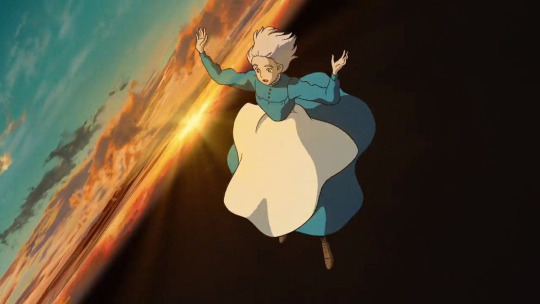
Bāhubali: The Beginning (2015) - 3/10 The next morning I watched some absolute trash. This crazy, over the top Indian movie is hilarious and I could perhaps recommend it if it weren’t so long. That being said, Bāhubali was not a dumpster fire; it has a lot of good-looking visual effects and it’s easy to see the ambition for this epic story, it just doesn’t come together. There’s fun to be had with how the main character is basically the strongest man in the world and yet still comes across as just a lucky dumbass, along with all the dancing that makes no sense but is still entertaining to watch. Seven Samurai (1954) - 10/10 If it wasn’t obvious already, Seven Samurai is a masterpiece. I reviewed this on The Sunday Movie Marathon podcast, so more thoughts can be found there. Red Road (2006) - 6/10 Another recommendation on episode 30 of the podcast. Red Road really captures the authentic British working class experience. Before Sunrise (1995) - 10/10 One of the best romances put to film. The first in Richard Linklater’s Before Trilogy is undoubtedly my favourite, despite its counterparts being almost equally as good. It tells the story of a young couple travelling through Europe, who happen to meet on a train and spend the day together. It is gloriously shot on location in Vienna and features some of the most interesting dialogue I’ve ever seen put to film. Heartbreakingly beautiful.
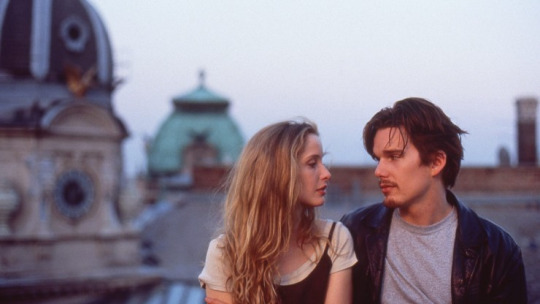
Tokyo Story (1953) - 9/10 This Japanese classic - along with being visually and sonically masterful - is a lot about appreciating the people in your life and taking the time to show them that you love them. It’s about knowing it’s never too late to rekindle old relationships if you truly want to, which is something I’ve been able to relate to in recent years. It broke my heart in two. Tokyo Story will make you want to call your mother. Before Sunset (2004) - 10/10 Almost a decade after Sunrise, Sunset carries a sombre yet relieving feeling. Again, the performances from Julie Delpy and Ethan Hawke take me away, evoking nostalgic feelings as they stroll through the contemporary Parisian streets. There is no regret in me for buying the Criterion blu-ray boxset for this trilogy. Before Midnight (2013) - 10/10 Here, Linklater cements this trilogy as one of the best in film history. It’s certainly not the ending I expected, yet it’s an ending I appreciate endlessly. Because it doesn’t really end. Midnight shows the troubling times of a strained relationship; one that has endured so long and despite initially feeling almost dreamlike in how idealistically that first encounter was portrayed, the cracks appear as the film forces you to come to terms with the fact that fairy-tale romances just don’t exist. Relationships require effort and sacrifice and sometimes the ones that truly work are those that endure through all the rough patches to emerge stronger. The Holy Mountain (1973) - 10/10 Jodorowsky’s masterpiece is absolute insanity. I talked more about it on The Sunday Movie Marathon podcast.
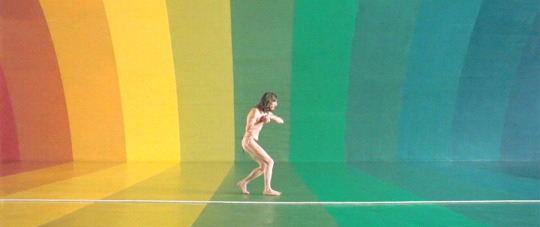
The Grand Budapest Hotel (2014) - 10/10 Another watch for Grand Budapest because I bought the Criterion blu-ray. As unalterably perfect as ever. Blue Jay (2016) - 6/10 Rather good up to a point. My co-hosts and I did not agree on how good this movie was, which is a discussion you can listen to on my podcast. Shadow and Bone: The Afterparty (2021) - 3/10 For what it’s worth, I really enjoyed the first season of Shadow and Bone, which is why I wanted to see what ‘The Afterparty’ was about. This could have been a lot better and much less annoying if all those terrible comedians weren’t hosting and telling bad jokes. I don’t want to see Fortune Feimster attempt to tell a joke about oiling her body as the cast of the show sit awkwardly in their homes over Zoom. If it had simply been a half hour, 45 minute chat with the cast and crew about how they made the show and their thoughts on it, a lot of embarrassment and time-wasting could have been spared. Wadjda (2012) - 6/10 Another recommendation discussed at length on The Sunday Movie Marathon. Wadjda was pretty interesting from a cultural perspective but largely familiar in terms of story structure.

Freddy Got Fingered (2001) - 2/10 A truly terrible movie with maybe one or two scenes that stop it from being a complete catastrophe. Tom Green tried to create something that almost holds a middle finger to everyone who watches it and to some that could be a fun experience, but to me it just came across as utterly irritating. It’s simply a bunch of scenes threaded together with an incredibly loose plot. He wears the skin of a dead deer, smacks a disabled woman over and over again on the legs to turn her on, and he swings a newborn baby around a hospital room by its umbilical cord (that part was actually pretty funny). I cannot believe I watched this again, although I think I repressed a lot of it since having seen it for the first time around five years ago. The Twilight Saga: Breaking Dawn - Part 1 - (2011) I have to say, these movies seem to get better with each instalment. They’re still not very good though. That being said, I’m amazed at how many times I’ve watched each of the Twilight movies at this point. This time around, I watched Breaking Dawn - Part 1 with a YMS commentary track on YouTube and that made the experience a lot more entertaining. Otherwise, this film is super dumb but pretty entertaining. I would recommend watching these movies with friends. Solaris (1972) - 8/10 Andrei Tarkovsky’s grand sci-fi epic about the emotional crises of a crew on the space station orbiting the fictional planet Solaris is much as strange and creepy as you might expect from the master Russian auter. I had wanted to watch this for a while so I bought the Criterion blu-ray and it’s just stunning. It’s clear to see the 2001: A Space Odyssey inspiration but Solaris is quite a different beast entirely. Jaws (1975) - 4/10 I really tried to get into this classic movie, but Jaws exhibits basically everything I don’t like about Steven Spielberg’s directing. For sure, the effects are crazily good but the story itself is poorly handled and largely uninteresting. It was just a massive slog to get through.
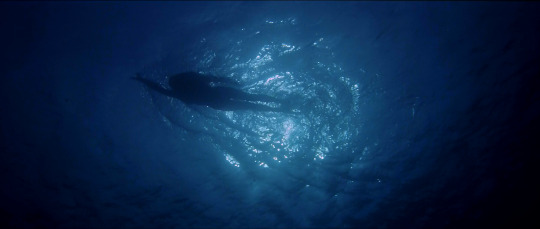
Darkman (1990) - 6/10 Sam Raimi’s superhero movie is so much fun, albeit massively stupid. Further discussion on Darkman can be found on episode 32 of The Sunday Movie Marathon podcast. Darkman II: The Return of Durant (1995) - 1/10 Abysmal. I forgot the movie as I watched it. This was part of a marathon my friends and I did for episode 32 of our podcast. Darkman III: Die Darkman Die (1996) - 1/10 Perhaps this trilogy is not so great after all. Only marginally better than Darkman II but still pretty terrible. More thoughts on episode 32 of my podcast. F For Fake (1973) - 8/10 Rewatching this proved to be a worthwhile decision. Albeit slightly boring, there’s no denying how crazy the story of this documentary about art forgers is. The standout however, is the director himself. Orson Welles makes a lot of this film about himself and how hot his girlfriend is and it is hilarious.
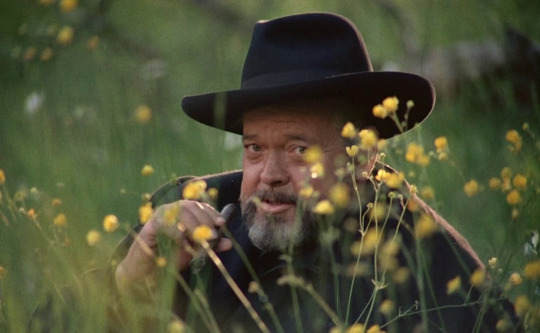
The Mitchells vs. The Machines (2021) - 4/10 More style over substance, Sony’s new animated adventure wants so much to be in trend with the current internet culture but it simply doesn’t understand what it’s emulating. There’s a nyan cat reference, for crying out loud. For every joke that works, there are about ten more that do not and were it not for the wonderful animation, it simply wouldn’t be getting so much praise. Taxi Driver (1976) - 10/10 The first movie I’ve seen in a cinema since 2020 and damn it was good to be back! I’ve already reviewed Taxi Driver in my March wrap-up but seeing it in the cinema was a real treat. Irreversible (2002) - 8/10 One of the most viscerally horrendous experiences I’ve ever had while watching a movie. I cannot believe a friend of mine gave me the DVD to watch. More thoughts on episode 32 of The Sunday Movie Marathon podcast. Don’t watch it with the family. The Golden Compass (2007) - 1/10 I had no recollection of this being as bad as it is. The Golden Compass is the definition of a factory mandated movie. Nothing it does on its own is worth any kind of merit. I would say, if you wanted an experience like what this tries to communicate, a better option by far is the BBC series, His Dark Materials. More of my thoughts can be found in the review I wrote on Letterboxd.
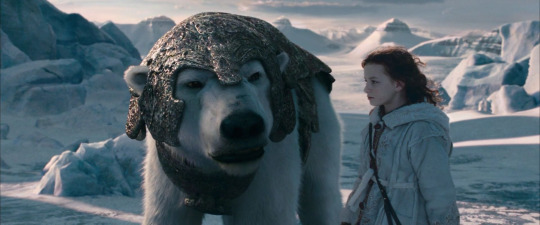
Antichrist (2009) - 8/10 Lars von Trier is nothing if not provocative and I can understand why someone would not like Antichrist, but I enjoyed it quite a lot. After watching it, I wrote a slightly disjointed summary of my interpretations of this highly metaphorical movie in the group chat, so fair warning for a bit of spoilers and graphic descriptions: It's like, the patriarchy, man! Oppression! Men are the rational thinkers with big brains and the women just cry and be emotional. So she's seen as crazy when she's smashing his cock and driving a drill through his leg to keep him weighted down. Like, how does he like it, ya know? So then she mutilates herself like she did with him and now they're both wounded, but the animals crowd around her (and the crow that he couldn't kill because it's Mother nature, not Father nature, duh). Then he kills her, even though she could've killed him loads of times but didn't. So it's like "haha big win for the man who was subjected to such horrific torture. Victory!" And then all the women with no faces come out of the woods because it's like a constant cycle. Manchester By The Sea (2016) - 6/10 Great performances in this super sad movie. I can’t say I got too much out of it though. Roar (1981) - 9/10 Watching Roar again was still as terrifying an experience as the first time. If you want to watch something that’s loose on plot with poor acting but with real big cats getting in the way of production and physically attacking people, look no further. This is the scariest movie I’ve ever seen because it’s all basically real. Cannot recommend it enough. Eyes Without A Face (1960) - 8/10 I’m glad I checked this old French movie out again. There’s a lot to marvel at in so many aspects, what with the premise itself - a mad surgeon taking the faces from unsuspecting women and transplanting them onto another - being incredibly unique for the time. Short, sweet and entertaining!

Se7en (1995) - 10/10 The first in a David Fincher marathon we did for The Sunday Movie Marathon, episode 33. Zodiac (2007) - 10/10 Second in the marathon, as it was getting late, we decided to watch half that evening and the last half on the following evening. Zodiac is a brilliant movie and you can hear more of my thoughts on the podcast (though I apologise; my audio is not the best in this episode). Gone Girl (2014) - 10/10 My favourite Fincher movie. More insights into this masterpiece in episode 33 of the podcast. Friends: The Reunion (2021) - 6/10 It was heartwarming to see the old actors for this great show together again. I talked about the Friends reunion film at length in episode 33 of my podcast.

Wolfwalkers (2020) - 10/10 I reviewed this in an earlier post but would like to reiterate just how wonderful Wolfwalkers is. If you get the chance, please see it in the cinema. I couldn’t stop crying from how beautiful it was. Raya and The Last Dragon (2021) - 6/10 After watching Wolfwalkers, I decided I didn’t want to go home. So I had lunch in town and booked a ticket for Disney’s Raya and The Last Dragon. A child was coughing directly behind me the entire time. Again, I reviewed this in an earlier post but generally it was decent but I have so many problems with the execution. The Princess Bride (1987) - 9/10 Clearly I underrated this the last time I watched it. The Princess Bride is warm and hilarious with some delightfully memorable characters. A real classic!

The Invisible Kid (1988) - 1/10 About as good as you’d expect a movie with that name to be, The Invisible Kid was a pick for The Sunday Movie Marathon podcast, the discussion for which you can listen to in episode 34. Babel (2006) - 9/10 The same night that I watched The Invisible Kid, I watched a masterful and dour drama from the director of Birdman and The Revenant. Babel calls back to an earlier movie of Iñárritu’s, called Amores Perros and as I was informed while we watched this for the podcast, it turns out Babel is part of a trilogy alongside the aforementioned film. More thoughts in episode 34 of the podcast. Snake Eyes (1998) - 1/10 After feeling thoroughly emotionally wiped out after Babel, we immediately watched another recommendation for the podcast: Snake Eyes, starring Nicolas Cage. This was a truly underwhelming experience and for more of a breakdown into what makes this movie so bad, you can listen to us talk about it on the podcast.
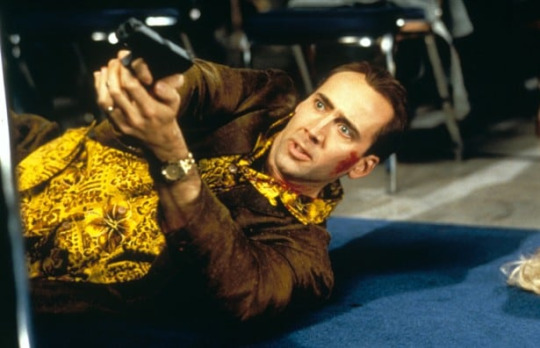
#may#movies#wrap-up#film#follow for more#Twitter: @MHShukster#tenet#nomadland#the prince of egypt#chinatown#howl's moving castle#bahubali: the beginning#seven samurai#red road#before sunrise#tokyo story#before sunset#before midnight#the holy mountain#the grand budapest hotel#blue jay#shadow and bone#shadow and bone: the afterparty#wadjda#freddy got fingered#the twilight saga: breaking dawn - part 1#solaris#jaws#darkman#darkman ii: the return of durant
118 notes
·
View notes
Text
April 8, 2021: Swiss Army Man (2016) (Recap: Part One)
Don’t think about the Boy who Lived.
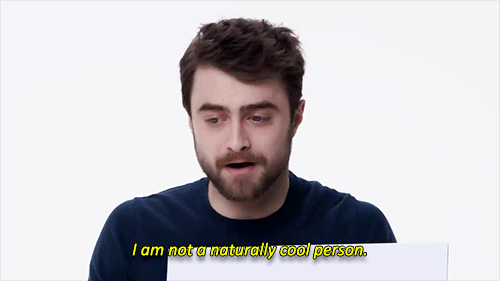
Daniel Radcliffe is a talented actor with a wider range than he’s given credit for. He’s been working since childhood, and has picked up quite a lot over time. While most famous for...a certain role that will go unnamed...he famously started his stage career in 2007 with the musical Equus, and that later progressed to How to Succeed in Business Without Really Trying, Rosencrantz and Guildenstern are Dead, and Endgame.
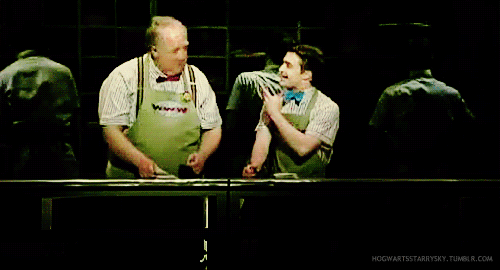
Meanwhile, he also made appearances of television in varied roles, live-action and animated. He started his career in an adaptation of David Copperfield in 1999, voiced a character on The Simpsons three separate times, hosted Saturday Night Live in 2012, and also currently has an excellent role in the anthology series Miracle Workers.
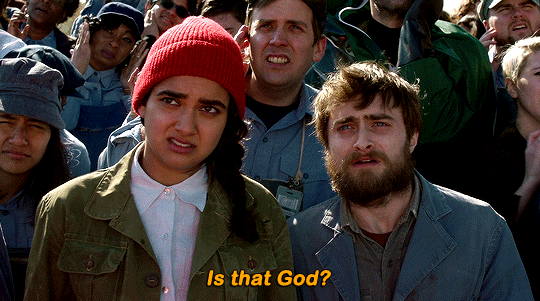
And MEANWHILE, he also had quite the robust film career, especially after...the role which shall not be named. There were a few films made during that time period, like December Boys and The Woman in Black, but most of his time was understandably taken up, as was his public image. That, of course, ends in 2011. The first time I saw him in a role outside he who shall not be named was in the film Kill Your Darlings, about the collegiate career and romance in the life of famous gay poet Allen Ginsburg. It was very good!
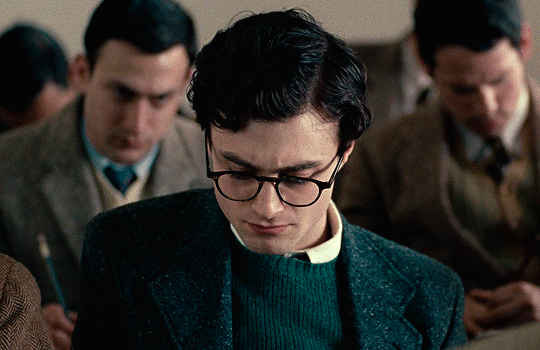
The same year, 2013, he starred in Horns, a unique fantasy film that I considered watching for Fantasy March. His film career would be full of ups (The F Word, Trainwreck, Lost in London) and downs (Victor Frankenstein, Now You See Me 2, Playmobil: the Movie oh God REALLY JESUS). And right in the middle of those came one of his most famous weird roles. And that’s today’s focus. And I’ve been wanting to watch it for YEARS. And while we’re talking about him, let’s talk about this film’s other star: Paul Dano.
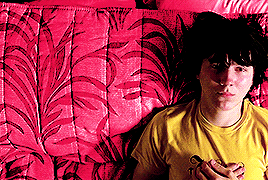
Dano’s career also began young, and in the opposite way to Radcliffe’s: in theatre first. After a stint on Broadway at the age of 12 (GODDAMN) in Inherit the Wind, as well as several other productions, he transitioned to film in 2000, around the same time that Radcliffe started as well. Eventually, he gained acclaim with his role in Little Miss Sunshine, and then...anybody else in the mood for a milkshake right about now?
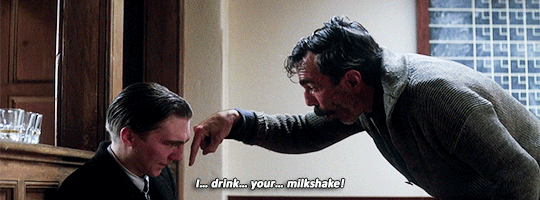
Yeah, I haven’t seen that movie, but I really should this year. Consider it on my list...at some point. I’ll figure it out. Anyway, Dano’s role in There Will Be Blood only increased his acclaim, and found him acting in a number of indie films. Dano’s definitely not a blockbuster guy, but that’s not to say that he completely avoids them either. He’s been in Knight and Day, Cowboys and Aliens, and Looper, which all fall under that category. And except for the last one...they aren’t especially good, either.
But again, he was also in 12 Years a Slave, Okja, Wildlife, Where the Wild Things Are, and Meek’s Cutoff, and all of those were critically acclaimed, and some almost reached blockbuster status themselves. So I don’t really know how to feel about his upcoming role as...the Riddler.
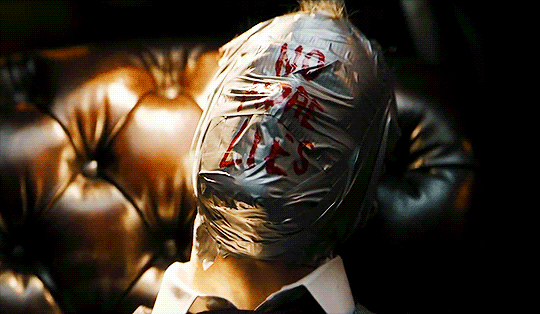
Yeah, we’ll see, but I’m holding my breath. Dano’s great, and I love the Riddler, but...I dunno. Like I said, we’ll see. But in the meantime, that’s enough navel-gazing. Let’s watch Swiss Army Man! SPOILERS AHEAD!!!
Recap (1/2)
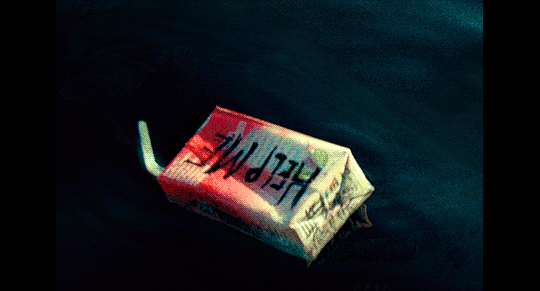
We begin at sea. If you have thalassophobia, this is already terrifying for you. After seeing many plastics floating on the ocean, covered in written messages, we make our way to a deserted island, where Hank Thompson (Paul Dano) is committing suicide after being stranded there for so long.
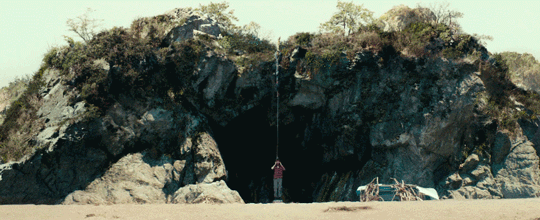
However, as he does, he spies someone lying on the beach. The rope snaps, and Hank runs over to greet the body, hoping that he isn’t dead. Unfortunately, after a very loud burst of flatulence, it’s pretty damn clear that this is a dead body. And yes, this is Daniel Radcliffe, but I’ll introduce him formerly when the time comes.
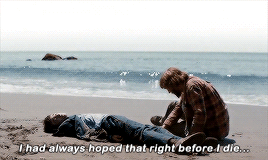
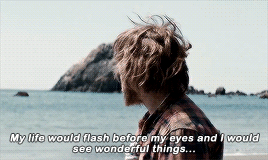
Hank’s sad that the guy isn’t alive, but still speaks to him about his hopes and dreams in the past. He’d always wanted a life of parties and friends and love, and imagined that he’d see that kind of life in a flash before he died. Instead, he only saw the body, who responds with yet another fart. But with that, Hank goes back to trying to hang himself.
And as he does...the body keeps interrupting with its INSANE gas. Like, it’s so bad that the body keeps shaking as if it were alive. The body washes into the sea, and its flatulence begins to propel it away from the shore. Hank sees this, and he uses the humming he was doing to make the Intro Song, which is strangely mesmerizing? Like, literally soundtrack-worthy, I’m not kidding. He also grabs a piece of his noose, uses it to grab onto the body, and rides it as the farts propel them both far away from the beach. It’s absolutely absurd...and kind of great. And then the titles play.
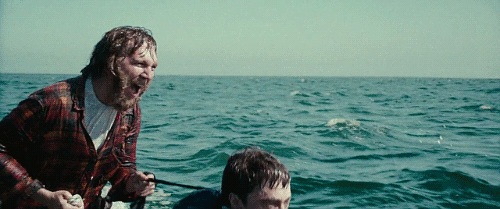
Hank wakes up on the short of a different island, or possible a larger land mass, and is overjoyed by the change in scenery. He shouts his name to the world, and credits the body with his rescue. No longer stranded in the Pacific, as far as we know, he tries to use his phone, to no avail. He decides to head out and look for help, grabbing a bag of Cheetos that washed up alongside them, bids the body farewell...and then comes back for it.
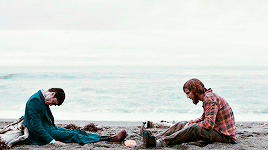
Carrying the farting body on his back (and kind of treating him as if he’s alive), he wanders through the forest to find help. He wonders if the gas is the result of decomposition (likely, if excessive), or if its the body’s soul leaving it. Either way, the trudge forward. They settle in a cave for the night, as it rains heavily outside. As Hank is want to do, he hums to himself, and shares more of his personal life with the body, as he sings to it. And yeah, I’ve been linking to these songs, because the soundtrack is genuinely fascinating to me.
Morning comes, and Hank awakes to a raccoon prying at the body, which he subsequently chases for food. In his desperation for food and water, he’s once again about to leave the body in the cave, but notices it leaking copious amounts of water from its mouth, which it had collected from the cave walls overnight. And yes...he drinks it. Which is absolutely disgusting when you think about it, which I now choose NOT to.
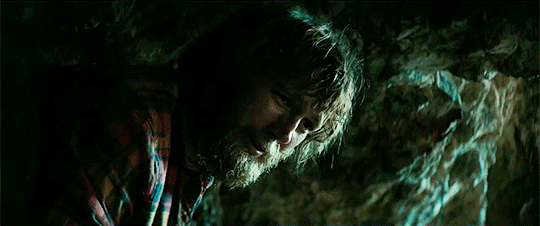
In the process, Hank squeezes the body for more water, and air escapes his mouth in such a way that it sounds like it’s speaking a name: Manny (Daniel Radcliffe). From that, Hank gets the body to speak his name and a simple greeting, but grows frustrated from the inability of the body to speak properly. This leads to him being a bit abusive towards him, reminding him unfavorably of his own father. Ooh, character revelations, me like.
Anyway, he apologizes to Manny for treating him that way...and Manny responds. Which FREAKS HANK THE FUCK OUT, understandably, and he punches Manny and flees the cave. As he comes back, Manny is indeed speaking outright, which is either a miracle or Hank just straight-up hallucinating. Either way, Hank asks Manny to try and remember his past life, but all he can get is the vague recollection of the Jurassic Park theme song. But Manny can’t remember the movie itself, which is when Hank says the most correct line ever said in all of film.
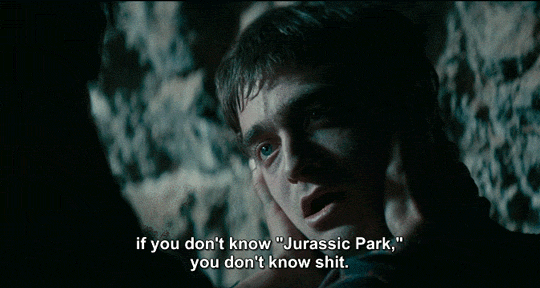
You’re goddamn right. Anyway, from, there, Hank tries to teach Manny about the ways of the world, and the nature of life and death. And the resulting conversation is absolutely fuckin’ ridiculous, and I love it all. Through the process, Manny learns about the world, and Hank asks him to help get home.
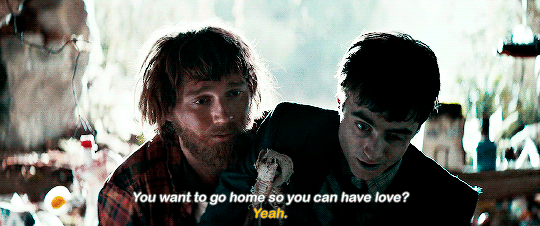
In the process, Manny inadvertently insults Hank, causing to walk off and once again look for help, only to eat poison berries and throw up for a sec. The two reunite, and their conversation turns to the topic of sex. See, there are some magazines in the cave that they’re in, which prompts some questions about women, sex, and love. To both of their surprise, this conversation causes Manny’s heart to beat! Spurred on, Hank continues, and Manny’s heart appears to reawaken...as does his penis. That’s a link to the soundtrack, I promise.
Hank and Manny both freak out, as his little Manny seems to have a mind (and motility) of its own. But in the ever absurd nature of this movie’s premise, this too has a secondary function: it’s a compass. Yup. And that prompts the next step of their journey, which is full of a conversation about fetishes and masturbation. Yeah, Hank’s surprised about that, too.
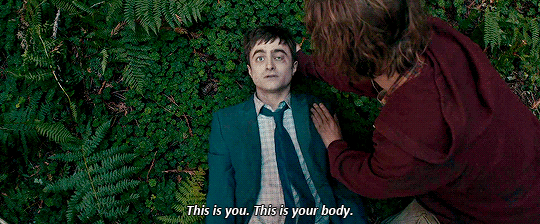
This leads to a conversation about his parents, as well as somewhat traumatic parts of his childhood, including his mother’s premature death. This makes Hank upset, and he lashes out at Manny, who briefly returns to being dead until Hank apologizes. As they go on, however, they encounter another denizen of the forest: a bear. This causes the two to fall off a cliff, and causes Hank’s phone to fall out of his pocket and turn on, allowing Manny to see the picture of a girl on his background.
Manny’s enraptured by the picture, and constantly asks to see her again, as Hank continues to struggle for food. The problem is that Hank needs to conserve the power on the phone, but Manny asks if Hank can dress up as the girl in order to help him remember, and bring him back to life to help save them both. He does so reluctantly, but Manny calls him beautiful, to which Hank reacts positively. This not only helps Manny come to life a little more, but also leads Hank to shave to look more convincing for Manny...and possibly for Hank, too.
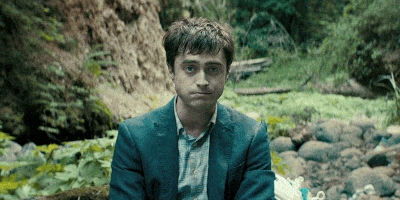
As these two engage on a fake date and create a fake bus (while Manny listens to a fake self-sung cover of Cotton Eye Joe that I’m putting on my playlist), this is a good time to mention the one thing I know about this movie...maybe. I don’t quite remember where I heard this, but I have heard that this film is possibly a commentary on the transgender experience, or at the very least that Hank is transgender, but hasn’t come to terms with that as of yet. Now, I don’t know if that’s true or not, but I have heard that, and I’m definitely interested to see if that’s the direction this goes. This scene definitely seems to somewhat confirm this theory. Also, I will say (as I have said before when watching The Danish Girl), I’m a straight dude of the cissexual sort, so this is in NO WAY in my wheelhouse, but I still figured I’d mention it.
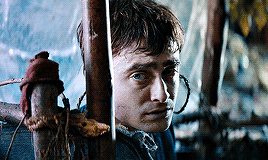
We’re also at the halfway point now, so this would seem like a good time to pause for Part 2! See you there!
#swiss army man#daniel scheinert#daniel kwan#daniel scheinert and daniel kwan#the daniels#daniel radcliffe#paul dano#mary elizabeth winstead#comedy april#user365#365 movie challenge#365 movies 365 days#365 Days 365 Movies#365days365movies#365 movies a year#moviegifs#tusernyx#userpayel#usermike
19 notes
·
View notes
Photo
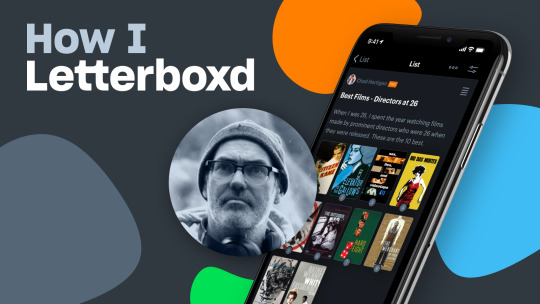
How I Letterboxd #10: Chad Hartigan.
Filmmaker Chad Hartigan talks to Jack Moulton about his prescient new sci-fi romance, Little Fish, why radio silence is worse than a bad review, and his secret system of Letterboxd lists.
Chad Hartigan has won prizes at the Sundance Film Festival and the Film Independent Spirit Awards for his acclaimed films This is Martin Donner and Morris From America. He’s also been a Letterboxd member since way back, joining what he proclaims as “my favorite website” in 2013. Hartigan has always been an obsessive logger: he has transcribed all of his viewing data since 1998 and continues to work on filling in the gaps in his downtime.
Like many ardent Letterboxd members, Hartigan is a diligent list-maker, keeping tabs on his best first viewings of each year and assembling an all-time top 1,000 films over the summer (with an accompanying 26-minute supercut). Perhaps unusually for a member of the film industry on Letterboxd, he’s unafraid to hold back his opinions and regularly voices his critiques on even the most acclaimed films.
Hartigan’s newest film, Little Fish, is a sci-fi love story starring Olivia Cooke (Sound of Metal) and Jack O’Connell (Unbroken). Written by Mattson Tomlin, it’s set during an imagined pandemic—shot long before our own actual pandemic—wherein a disease causes people to lose their memories. It was set to premiere at the 2020 Tribeca Film Festival, and then postponed due to Covid-19. It’s now out in limited theaters and on demand, and we were delighted with the excuse to put Hartigan in the How I Letterboxd spotlight.

Olivia Cooke as Emma and Jack O’Connell as Jude in ‘Little Fish’.
You made a pandemic movie before the pandemic. How do you feel about accidentally hitting that unfortunate zeitgeist and now consequently being asked questions like this one? Yeah, strange. The questions are fine. If it wasn’t this one, it would be another that you would have to answer over and over again. One of the things that drew me to the project was that it felt like a fantasy that wasn’t necessarily rooted in reality in a way that my other [films] were. I liked that it’s old-fashioned in its attempts to purely take you somewhere and wasn’t intended to hold up a mirror to our times—but then in the end that’s exactly what it’s doing. I’m curious myself, and I’m checking Letterboxd to see the reactions from people because I really couldn’t guess what it would have been like [now].
Are there any prescient details you’re proud of getting right? I’m so grateful and happy that Jack [O’Connell] is wearing his mask correctly. That’s the number one thing that I’m glad we got right. I think it was very smart of Mattson to focus the movie on [the relationship] rather than the details of this global pandemic. I feel the reason it’s not in bad taste is because it dealt with those things as a backdrop and instead focused on people just trying to remember what’s important and clinging onto those that they love.
Onto our own favorite memory aid, Letterboxd. How did you discover us and how did you manage without us? I’ve been on since 2013, so I’m probably one of the earliest people to jump on it. I love the interface and the diary, just aesthetically it was really fun. I’ve been keeping track of what I see with analog [methods] for as long as I can remember. I have diaries and planners so I logged all that old information. If I was running for president, my platform would be that everybody is required to use Letterboxd comprehensively, because I just love to know what everybody is watching all the time.
Do you talk about Letterboxd in the real world with the other filmmaking people? Yes, and I’m often trying to convince them to join. Other filmmakers are more concerned about having their opinions on peers be public knowledge than I am, I guess. I’ve made four films now and each one’s been bigger and more widely seen than the last. The very first one was a total no-budget affair that couldn’t get into any festivals and I was very excited when I finally got it into the Hamptons Film Festival. It was about half-full and one or two people came up to me afterwards and said they liked it. This was pre-Twitter so I spent the whole next day Googling to see if anybody had written anything. I was so curious to see what people thought and there was nothing—not a review, not a blog—just total emptiness.
When the next film got into Sundance, there were people tweeting their reactions and actual reviews and I read everything. People were asking if the bad reviews hurt me. Absolutely not—nothing can be worse than the radio silence of nobody caring about the first film. The fact that people care enough to sit and write about this movie—good or bad—is a win, and I’ve carried that onward. I like to see what people think, it can be helpful in how you view the film as a success or failure. You learn and move on.
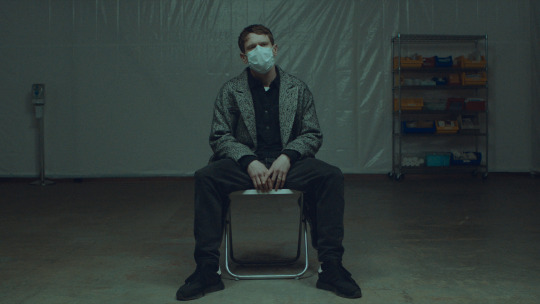
Jack O’Connell at least remembers how to wear a mask in ‘Little Fish’.
Some filmmakers have told us they’re kinder to films after making their own, but you’re not shy at all about being critical. How did making your own films change your perspective as a critic? I don’t consider myself a critic so that’s why I’d be less concerned with someone reading what I thought. Why should they put any stock into what I think? If they get hung up on it then that’s their own stuff because I’m not a critic. Like everyone else on Letterboxd, I just love watching movies. Obviously I can appreciate and understand some of the technical aspects maybe moreso than people who don’t make films, but at the end of the day, rarely that’s the thing that makes you love a movie or not. There’s a great bit in Francis Ford Coppola’s commentary track for Finian’s Rainbow where Fred Astaire’s doing a dance number and [Coppola admits] he totally messed it up because Astaire’s feet aren’t fully in frame. He’s very honest about his mistakes because it’s one of his earliest movies. Then he goes on to say that he thinks there’s the same number of mistakes in Finian’s Rainbow as there are in The Godfather, it’s just that he made mistakes on the things that don’t matter for The Godfather. No film is perfect, but if it can latch onto this one magical aspect that connects you to it, that’s what makes you love it or not.
You had a project where you chart the best films made by directors at certain ages as you reached that age. Tell us more about it. That was a great project. I got the idea when I was 26. This was back when I had a Netflix DVD subscription and it was just hard for me to randomly choose DVDs to throw in the queue. I needed a system. I decided to watch movies from directors when they were my age and see if there’s some common denominator, something I can learn. At that point, there weren’t many, there were films like Boogie Nights and Fassbinder films. Not many people had made stuff when they were 26 or 27, so it was very feasible. Every year there were more movies and more directors to add to the list and it became time-consuming. I did it all the way up until I was 34 and the reason I stopped was because I had a son and there was no way I could continue this level of viewing output.
My favorite part of your account is the fact that you log every viewing of your own films. You know for a fact that you’ve watched Morris From America 26 times and Little Fish fifteen times. Why do you log them? What counts as a viewing? I’ve clearly watched those movies many more times in little chunks but I’ll only log it if we’re sitting down and watching it from beginning to end. I have a ticket to see Little Fish in the drive-in on Saturday, so it’s going to be logged again. Why do I do it? Like I said, I wish everyone was required to use Letterboxd comprehensively. That’s what it’s there for for me, an accurate log of what I watch. This is psychotic behavior but I’m tempted to have a Letterboxd account for my son. I’ll do his views for him once he starts watching movies until he’s old enough to take over. It’ll just be, like, Frozen a thousand times but he’s not old enough to watch anything yet, so we’ll see.
Have you discovered any films thanks to Letterboxd discourse that influenced your approach to filmmaking? For sure, I can’t maybe say specifically, but once I dropped the directors my own age system I didn’t replace it with nothing. I’m a Virgo and I have a little bit of OCD, so I have to have some system. I’ve replaced it with a new complicated system where I pull from different lists and that’s now my main source of how I choose a movie to watch. I have like ten or twelve different lists, each about a thousand movies with a lot of overlap. One of them is my own list of every movie I’ve seen in a theater and I’ll go and look through that and if it’s something I want to revisit. Recently I rewatched Twister, which I hadn’t seen in a long time and is an old favorite from when I was in high school.
I have a bunch of private lists I cycle through; every movie nominated for a Spirit Award, every movie that’s won an Oscar, every movie that’s played in competition at Cannes, the top 1,000 films at the box office. There’s another great website that I use as a biblical resource which is They Shoot Pictures, Don’t They? and their lists of acclaimed films for all-time and the 21st century. I hit those up often. Something that I watched purely because of the very high Letterboxd rating and really loved is Funeral Parade of Roses. I try to see as many movies as I can that have a 4.0 rating or higher.
You respect the Letterboxd consensus. I do, but I don’t always agree with it.

‘Little Fish’ director Chad Hartigan.
Which is your most underrated or overlooked movie according to Letterboxd? I can say I was the very first person to log a movie called Witness in the City, which is an Italian noir movie I watched when I was doing my ‘directors my own age’ series. Literally nobody had logged it, so my review was like “whoa, I can’t believe I’m the first person to log this!”. It was very exciting for me because it’s great, but I’m the OG logger of that movie.
From your list of every film you’ve seen in a theater since you were twelve, which was your most memorable experience? The cheap answer is that it’s hard to top my own movies. The Sundance premiere of Morris From America at the Eccles Theater is maybe the best, but if I’m disqualifying my own films, seeing Scream 3 in a very packed theater in Virginia Beach was really fun, really rowdy. There was a trailer for a Jean-Claude Van Damme movie and I remember the climax was Van Damme going “you lied to me!!!” and everyone laughed. Someone did a George Costanza move later during Scream 3 and yelled out “you lied to me!!!” and everybody laughed again—so that’s a high. That’s the thing I miss the most about movie theaters, and the worry I have if theaters go away, is that so much of how we feel about a movie can be tied to the experience; who we saw it with, what we did before or after, what the crowd was like, or if anything strange happened. There are a lot of movies I have strong memories and affection for because of the experience of seeing them and I probably wouldn’t feel the same way about if I just watched it at home on my laptop.
I typically like to cap interviews off with what filmmakers thought was the best film of the past year, but we have your data to hand. For you, it’s Garrett Bradley’s documentary Time. Can you talk a bit about what makes the film stand out for you? One thing I learned about myself from the pandemic is that the motivation and desire to see new things is very closely tied to the theater-going experience for me. Once that was taken away and you could watch a new movie at home, it joins the pile of all the other movies. The fact that it’s new doesn’t really do anything for me. Why would I press play on Da 5 Bloods when I still haven’t seen Malcolm X? I gotta see Malcolm X! There wasn’t an urgency, so I saw far fewer films than in an ordinary year. But Time I found incredibly moving and important. Similar to what I liked about the Little Fish script, it’s so hyper-focused on one relationship and within that one story it has so much to say about larger issues and the world at large. It was an emotional and rich viewing experience.
‘Little Fish’ is on demand and playing in select theaters now. Images courtesy of IFC Films.
#little fish#chad hartigan#life in film#film director#letterboxd#how i letterboxd#letterboxd member#letterboxd tips#olivia cook#jack o'connell#romance#romantic film#sci fi romance#pandemic movie#covid movie
8 notes
·
View notes
Photo
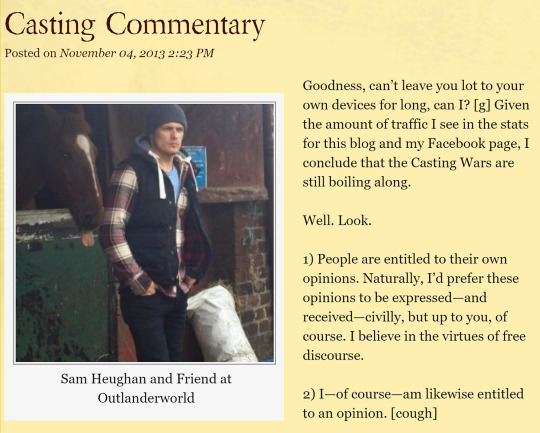
Diana Gabaldon’s Commentary on Casting Sam Heughan as Jamie Fraser | November 4, 2013
Goodness, can’t leave you lot to your own devices for long, can I? [g] Given the amount of traffic I see in the stats for this blog and my Facebook page, I conclude that the Casting Wars are still boiling along.
Well. Look.
1) People are entitled to their own opinions. Naturally, I’d prefer these opinions to be expressed—and received—civilly, but up to you, of course. I believe in the virtues of free discourse.
2) I—of course—am likewise entitled to an opinion. [cough]
Now, my opinion is based on rather more information than most others expressed here, because
a) I created Jamie Fraser and thus—presumably–have a pretty good idea of what he really looks and acts like.
b) While I haven’t yet met Sam Heughan, I’ve seen Rather a Lot of him (about 95%, at a rough guess), both in terms of
a. Photographs, and
b. Film, and
c. Bits and pieces, like audition tapes
Naturally, everyone forms mental images while reading. Everybody. I do it when I read other people’s books, too. Now, I can’t imagine why anyone—having read OUTLANDER—would form an image of Jamie as a 7-foot tall Bozo the clown on steroids, but you know….whatever floats your boat.
Why anyone should expect a film company to a) telepathically extract your personal vision of a character and b) try to replicate that onscreen is one of the Great Mysteries of the Universe, and I’m not about to try to solve it here—I got a book to write, among other things, and there are only so many hours in the day.
So I’m just going to say This about That:
Y’all have not seen Sam Heughan “be” Jamie Fraser.
I _have_.
[See more under the cut.]
Now, when they told me who they’d chosen and that they were sending me the audition tapes, I was in the car, driving from Phoenix to Santa Fe with my husband. Unable to get to my computer until we got to Santa Fe, I was madly googling “Sam Heughan” on my iPhone (my husband was driving, I hasten to add).
Frankly, I thought he looked bizarre. He’s 6’3”, that’s fine…very chiseled face, but oddly chiseled, and what’s with the large forehead and cleft chin?!? Jamie doesn’t have a cleft chin and his nose is not all that long, though it _is_ straight…and good grief, I know we wanted somebody who could play a 22-year-old virgin, but this guy hardly looks like he has hair on his behind, let alone the dangly bits…but…
But.
But you know, I _do_ understand what it is that actors do.
(Do you know that, btw? What they do is magic. They can become somebody they aren’t—and their physical outline is just Really Not That Important. (Within limits. Tom Cruise as Jack Reacher is a long way outside those limits…).)
So I sat down at my computer, sort of looking warily through my fingers. Willing to suspend disbelief if I could, but kind of dubious, you know?
So here he is, dark-haired, in a long-sleeved gray T-shirt, and I’m thinking, “Boy, he doesn’t look _anything_ like his IMDB photos, he actually looks pretty human, that’s a relief…”
And five seconds later, Sam Heughan was GONE, and it was Jamie Fraser right there in front of me. True. No costume, no makeup, no props, nothing but cues from an offstage casting director, and…it was him.
He did two scenes. First, a confrontation with Dougal, right after Dougal’s ripped his shirt off in the tavern.
“Devil take ye, Dougal MacKenzie! I dinna owe ye that!” Blazing blue eyes, swelling shoulders, and…bam. Showed this small bit to a (male) friend recently, who blinked at the screen and said, “Man, he’s powerful!” He was.
Second scene was even better; it’s the scene where Jamie explains to Claire exactly why he’s about to punish her. [g] And he had it all: patience, seriousness, annoyance, patience, humor, menace, humor, and…enough sex to drop anyone with functioning ovaries in their tracks.
Now. In the months since then, the production people have been kind enough to show me the occasional glimpse of this or that. I _have_ seen the red hair in its full glory (it took seven tries—and 27 hours in a salon chair, I was told by the victim), and speaking as someone married to a red-head (himself Jamie’s original body model) and with two more in residence…it’s definitely the right kind of red.
Red hair—as I notice a few red-heads have been mentioning—looks Way Different, depending on the light. Unless it’s truly carroty (and Jamie’s is Definitely Not), sometimes it looks almost brown, sometimes it’s red-gold and sometimes it’s all different colors and sometimes it has almost-blond highlights and sometimes…well, let’s put it this way: it doesn’t look like Bozo the clown or Shamus the Wrestler, it looks like Real Hair, just red. (And if you really worry about this, do go and google “red deer images” and _see_ what the heck a red deer’s pelt looks like.)
But beyond the physical details (which are, um…Really Good, and decency prevents me going further, save to say that while Jamie certainly doesn’t look like Thor (gag me with a spoon), he—and Mr. Heughan—look Very Nicely Muscled indeed)….Sam Heughan can _act_. And he totally nailed it.
So. Feel perfectly free to express your own opinions. (I don’t know quite what people expect as a result. Surely they don’t figure that Starz will say, “Oh, no! Robyn MacGillicuddy Stimson thinks Chris Hemsworth should be Jamie! Get Hemsworth’s agent on the phone!” Or at least I hope they don’t think that…) You’ll change your mind in due course.
Or I’ll pay you a dollar. [g]
I love to read Diana’s early impressions of Sam Heughan! The “bizarre” remark about his appearance was so strange! (Elsewhere, Diana even said she initially thought he looked “grotesque”!) 😂
I was reading a post recently where someone completing mischaracterized part of Diana’s initial impression of Sam Heughan. They apparently did so to promote a certain “agenda” about Sam. Consequently, I thought I’d post one of her earliest (and most thorough) commentaries about her early impressions of Sam. (For some of her even earlier comments about Sam--from July 5 to 9, 2013--see POST1, POST2, POST3, POST4, POST5, POST6. BTW, these comments are consistent with Diana’s November 4th commentary. After seeing Sam transform himself into Jamie, Diana was clearly a fan.)
[edited]
54 notes
·
View notes
Text
A nostalgia retrospective at Frozen
I was of the generation that grew up with frozen as the defining childhood event, I think that says a lot about my age, I remember watching the movie in the theatre with my mom and having my little popcorn in one hand and my little cup of fizzy drink in another and being amazed by our lord and savior Elsa of Arendelle. Saying that this movie changed my little barely developed frontal lobe is an understatement, it fucking penetrated it and all I could think about for months on end was Frozen. While writing the script for this I listened to Let it Go and inexplicably I had flashbacks of little petite me compulsively almost replaying that song. Remembering the hold of that movie on me and people of my age during that time feels unreal, it honestly seems like Disney sprinkled in a bit of crack into that song. My general thoughts when I watched it in theatres was that this film was perfect in every sense and Elsa was the hottest woman alive.
Recap
Before I dive into the video, I will give a brief background or refresh of the film for the three people who haven’t seen it and those who haven’t seen it in like seven years since its release. Frozen is a 2013 animated movie made by Disney, there’s Anna the cute and clumsy ginger sister, Elsa the sister that Disney made approximately half a million dollars off of merchandise, Kristoff the furry that talks to reindeer, Olaf a snowman, and Hans the evil ginger. The story centers on Anna and Elsa; as a child, Elsa accidentally hit Anna in the head with her ice magic while playing with her. To fix Anna’s brain essentially she had to have all her memories of Elsa’s magic removed. So from that incident onward, Anna doesn’t know about Elsa’s powers, and because of the incident, Elsa started to distance herself. So the sisters barely have any contact for the fifteen or so odd years. The sisters are reunited on Elsa’s coronation day and Anna sings a song about open doors and finally getting to meet people again that hits different in 2021. Anna pisses Elsa off because she wants to marry a ginger man with sideburns. They fight and in the heat of the moment Elsa shoots ice at her sister. The secret is out and Elsa is overwhelmed so she runs away to the mountains to build her ice castle and we get the song that won Disney ‘Best Original Song’ at the Oscars. Anna gets on a horse and goes to search for her sister in the northern mountains. Then her horse fucks off and she finds her way to a convenience store? Is that what you would call it? And she meets our lovely golden retriever boy Kristoff and for a pickaxe, some rope, and some carrots for his reindeer, he agrees to take our cute little ginger north. On the way, they find Olaf who is a sentient snowman that Elsa created with her magic. They go to Elsa’s castle and Anna tries to convince Elsa to return to their home and to make it summer again. I don’t know why she would want that since winter is the superior season. Anyways Elsa is unconvinced and still wants to be a hermit. Anna pushes a little too hard, we get a lovely duet between the sisters and then Elsa blasts Anna’s heart. Oh no Anna’s poor heart is starting to freeze as her hair slowly turns white. Kristoff brings Anna to the trolls that treated Anna’s head all those years ago, coincidentally those trolls also were the ones that raised Kristoff. Then we get the cutest musical number ever to exist, fucking fight me. Granddaddy troll tells Anna and Kristoff that she needs an act of true love to thaw her frozen heart. So Kristoff delivers Anna back to the ginger with the sideburns because they think that the little ginger boy is Anna’s, true love. So while that happens Hans and a couple of people are at Elsa’s ice castle trying to capture her, but she doesn’t want that so she almost commits a double homicide. This is the point where I thought she’d make a great video game character. Some random dude tries to fire an arrow at the distracted Elsa but Hans stops him and the arrow, unfortunately, fires into the ice chandelier above and that thing crashes down on Elsa knocking her out. She then is carted back to Arendelle and put in chains, she pleads for her freedom and Hans is like I’ll see what I can do. Anna arrives at the castle and asks Hans to kiss her, but low and behold the ginger is evil and never loved Anna and just wanted the throne so he doesn’t kiss her and leaves her to die. In the meantime, Elsa escapes from her dungeon and Hans is chasing her down. Anna is rescued by Olaf and they decide to run towards Kristoff because he must love her and then he can reverse the frozen heart. So Elsa is running, Anna is running, Hans is running and so is Kristoff. Hans catches up to Elsa and tells her that Anna died because of her and that it’s all her fault, Elsa is devastated and Hans takes the chance to try and kill her. Anna who is running towards Kristoff sees this happening and instead of running towards her true love she decides to go and save Elsa. Her body turns into ice fully as she blocks the sword from slicing Elsa in half like a piece of white tuna. Elsa sees this and she cries over Anna’s icy figure and her tears thaw Anna’s frozen heart since it is an act of true love because the sisters love eachother. Elsa realizes that love is what she needs to reverse winter and bring back summer, and so she waves her hand a bit and takes back all the snow. Kristoff and Anna kiss, Olaf gets to experience summer, and Elsa’s crippling social anxiety is solved. The end.
The Music
When I was watching frozen I found it so strange that I pretty much remembered the lyrics to everything. I’ve never been much of a musical person I never liked musicals that much but I found that in this movie the music was one of the main enjoyment of it. Perhaps it’s just me in my old age but I honestly felt like these songs aged like fine wine, even the ones that I didn’t like as much or wasn’t musically ambitious I still found them extremely enjoyable. I also liked the score how they incorporated some kind of Scandinavian music in it and it just made the world-building better. Let it Go was just as ear-wormy as I remembered and it was just as powerful as I remember because we’re just coming off of Elsa running away scared and this song is essentially her owning her socially awkward ass and saying yes I want to be a hermit and there’s nothing wrong about it. Which my now more developed frontal lobe resonated deeply with. Now I know this video isn’t about comparing Frozen and its sequel but I will have to mention how I realized how much simpler and more or less conventional pop song-y the first movie’s songs are. I also listened to into the unknown and show yourself on youtube prior and those two songs feel more ingrained in the world and the lore. Which does make sense since the second movie is a bit world-building. But for Let it Go and Do you wanna build a snowman the mystical and magical feel that songs in Frozen 2 have isn’t present. I understand since into the unknown and show yourself are all sorta about a spirit, but I just wished that the main songs in Frozen incorporated some form of Scandinavian music that’s present in the opening song and the score.
The Characters
Kristoff
Recently it has been pointed out to me that I might just have an inclination towards big blonde himbo characters, I simped for Matthias in Six of Crows, and I positively melted at the sight of Kristoff the big blonde boy with a fetish for reindeer. Kristoff was probably my favourite character upon this second viewing. There’s absolutely no concrete or sound reason for it that I can defend with words. Literally, I just have a gene in my DNA that just makes me extremely biased towards that type of character. I love his grounded personality in comparison with Anna’s slightly airheaded disposition. I love that he’s raised by trolls it just makes me feel happy.
Anna
Anna is often looked upon as the lesser sister by Disney’s merchandising and in turn by the little girls who were the primary audience of this movie. One this second viewing with my more mature and refined taste I actually respected Anna as a character and I thought it was good that she was so ordinary because it was refreshing almost and it made her much more endearing. The takeaway I had from the movie was that Anna was kinda a self-insert character, she’s just like the audience going on an adventure and only just learning about her sister’s powers, she’s relatable to the audience. She’s the perfect ordinary relatable gal that everyone loves. The one thing I wish she had was a proper character arc, granted she doesn’t need one, but Disney almost tries to shoehorn in one with the inclusion of Hans and how he wasn’t her true love. Her arc is almost like discovering that true love doesn’t come from someone that she met just two days ago. Because Disney wants to do meta-commentary on their own material but Anna doesn’t even really learn that lesson? Because Hans not loving Anna isn’t a product of them only knowing eachother for two days but instead a product of him being evil, so the thesis that Disney so badly wants to prove was undermined by their own twist villain. And then even worse they imply that Kristoff instead is Anna’s true love even though Kristoff has known Anna for roughly the same amount of time as Hans. So if you are trying to make a point that true love doesn’t happen in a couple of days then sorry Disney you failed…?
Elsa
She’s the main character the story centers around her and she has the most complex emotions, character arc and personality. Her arc is one about her overcoming her fear of her own powers and it fulfills that change in the character somewhat. Near the end of the movie, we see her distraught more than ever because she believes her powers killed her own sister and she is positively depressed. But then she’s able to save her sister with the power of love. And she uses the same power of love to reverse her power, and we assume with the power of love she learns to control it. Which is a bit of a cop-out just having all her internal issues be solved with love, Elsa doesn’t really learn anything she learns that i guess Anna loves her? Which I thought she knew from the beginning. And it would be strange if she didn’t love Anna since the beginning or if she didn’t know that Anna loved her. Elsa’s issue was that no one understood her, and that issue still isn’t solved by the end and Anna’s love certainly didn’t solve that issue so I don’t really think that ending fits with her character. It would have made more sense if Elsa was a villain who didn’t understand love or who shitted on the idea of love then this ending would have been better.
Hans
Out of all the characters, Hans is done the dirtiest. I know I make fun of him for being a dirty little ginger but i think he had so much potential in being a good character and a good subversion of the prince charming trope and they squandered every bit of it for a twist villain. We could have had them sing the same love is an open door song but have them over the course of the movie slowly realize that they don’t really love each other and it finally culminates in the supposedly true love’s kiss not working. Then Anna would have learned her lesson and Hans wouldn’t be a terrible twist villain with motivations that don’t make sense. I felt so strongly after this viewing that Hans should have been redeemed in the second movie somehow.
Olaf
I’m not going to count him as a character because he’s a snowman and his personality starts with comic relief and ends with merchandise sales.
Sven
I love Sven and the relationship he has with Kristoff, it’s cute it establishes Kristoff as a good well-meaning furry so the audience instantly is able to connect with him and trust him.
The Plot
I found in retrospect the movie was so much more complex than I remembered, as a little petite child I didn’t understand that there was so much political intrigue? I’ve been recently rewatching Game of Thrones the good seasons and watching Frozen I thought like wow this feels so game of thrones esque (mostly just Hans’s elaborate but completely ridiculous plan) and I was just thinking how it would have played out differently if Frozen was a Game of Thrones political fantasy movie. Anyways the plot of Frozen is singlehandedly fucked by Disney’s compulsive twitch to make a twist villain. In the beginning, we meet Hans and he’s charming and cute and positively enamoured with Anna. We even get this little scene of him smiling to himself once he met Anna that just doesn’t make sense at all when you watch it a second time and realize this bitch was never meant to love Anna at all. In a much earlier version of Frozen, where Elsa was more of a classic Disney villain (she would eventually become good), Prince Hans in that version was also established as a twist villain. But Disney decided that Elsa as a villain didn’t really connect with the audience so they decided to change the story and make Elsa more sympathetic but they still had to keep the element of Prince Hans being a villain to provide drama and twists. So ok Hans had to be evil, no negotiation let’s assume Daddy Disney said we have to have evil ginger or I will eat ur firstborns, or whatever. But that still doesn’t explain why the setup had to be so bad. The main reason why Hans is such a bad twist villain is that there was never a setup for him to be evil, a lot of his earlier scenes don’t make sense in retrospect when you know that he was scheming for the throne all along. The scene where he and a few of the castle men are in Elsa’s palace and one of the men is about to shoot Elsa and kill her, but Hans stops it even though he admits out loud to Anna later that he needed an accident to happen to Elsa so he could get the throne. Well, Hans, there’s your accident, did you have a sudden stroke of kindness to spare her or are you playing some sort of 4D chess us mere mortals are too stupid to understand? Because clearly having her being shot by someone else would absolve him of any guilt., and he’d definitely look less guilty than if he was going to slash Elsa in half on a frozen ocean in plain view of the castle. I know this criticism is a relatively dead horse so there’s no reason to go too in-depth with it. Hans doesn’t make sense and very easily you could have written Hans to be just a regular guy that serves the purpose of teaching Anna the lesson that true love isn’t found but is instead built over years. Who would be the villain then? Well, it’s simple, we already had the townspeople being generally scared of Elsa’s powers so it’s very easy for Disney to have just made them the antagonists. Elsa can still be captured and brought back to Arendelle with Hans not really wanting to kill her but the townspeople are sick and tired of this winter and they want her dead (this also coincidentally aligns with papa troll’s vision of Elsa’s power inspiring fear and people turning on her). Elsa could escape the prison just the same in the original movie only this time she goes outside and finds an angry mob waiting for her who try to chase her down. Anna sees this and can run to protect Elsa like she does in the original, she blocks a blade and that sends a powerful force that sends the townspeople backward. Anna turns into ice, Elsa cries, bada bing bada boom I just wrote you the last 7 minutes of Frozen but actually making sense without changing anything in the first hour and a half. I liked that the movie focuses on sisterly love and I think that’s ultimately the strength of Frozen and what differentiates it from other previous Disney princess movies.
Meta-commentary
This movie also continues the meta-commentary on Disney’s family-friendly brand image that started with Tangled in this new era of animated movies, or perhaps with Enchanted if we count that as an animated film. I remember not noticing as much when my stupid little child brain was watching the movie for the first time but this time around I found it a bit annoying, especially given that the criticism they ‘address’ is extremely shallow, like ohh instead of marrying after three days Anna and Kristoff wait a few years until they marry, congrats Disney you have earned the progressive animation studios plaque. This is a bit nit-picky for this movie since this one isn’t egregious with the ‘subtle’ commentary, I feel like they’re particularly annoying in the live actions but generally passable in Frozen.
The Plot that never
I think I have to mention in this video that originally Elsa was going to be a stone-cold villain who is redeemed at the end of the movie after learning how to love. This is the same version I mentioned previously where Hans was the twist villain who would try and set an avalanche on arendelle. Elsa and Anna weren’t going to be sisters so....can I just say that the plot as it is...it could have been an enemies-to-lovers story, featuring our first lesbian couple in a Disney movie. It feels like such wasted potential. I’m sure someone can write fanfiction with this idea to satisfy my...needs. #i need this very very badly
The Animation
Arguably the best quality about any animated film is the animation. Even after 7 years I still feel awe and wonder when I watch Elsa raise her ice palace from snow and the animation of the ice is just jaw-dropping every single time I watch it. There’s one specific detail I love seeing and it’s Elsa’s shoes, like everything her skirt lifts up slightly when she’s running you get a peek at her shoes and they’re fucking gorgeous like she’s wearing glass slippers! Holy fuck her feet look so graceful and dainty and Elsa just single-handedly gave me a feet fetish. That’s what I took away from Frozen, sisterly love can conqueror all and feet are hot. Reading articles about the process of making Frozen really shows how dedicated the animators were to this project because they brought a real fucking reindeer in into the studios (allegedly according to this website I read). They studied the way cloth moves when it’s frozen by water and the way snow falls from a tree. It’s incredible and watching the movie you can really tell how dedicated the animators were to this project.
The Legacy
Many believe that the release of Frozen and the earlier animated film Tangled started another renaissance period for Disney, which I think on some level is true since Disney has released quite a few of those ‘princess’ movies that feel like a return to form for the company in the past decade. In a more cynical view, I also feel like Frozen’s success was where Disney realized that merchandise was perhaps the most profitable thing under the sun. If anything the aggressive merchandising of the characters and the songs are what lingers in people’s minds after all these years. The toddlers shouting the lyrics to let it go at the top of their lungs, Frozen theme birthday parties, everyone wanting to dress up as Elsa for Halloween. I feel like the push to make as much money as possible off of Frozen’s success kind of diminishes the film itself. To the general public it isn’t remembered for its beautiful animation or its characters even to a certain extent, but instead, Frozen is remembered for its merchandise being absolutely everywhere which subsequently ended up with a lot of people being fed up with the property. I feel like we can definitely see the merchandising tactic Disney learned with Frozen with the new Star Wars trilogy where new droids were created en masse for merchandising purposes.
Frozen also birthed a sequel that was largely forgettable in comparison to the first movie, which I feel very disappointed about since even more effort was clearly put into the animation on the second movie. I won’t get into the arduous rewrites and script overhauls that Frozen 2 experienced in this movie but I will say that the success of Frozen probably had something to do with the hyper management of the sequel that led it to be so mediocre and forgettable.
The End
The overall feeling I have with this movie is nostalgia and fondness. Obviously, it isn’t a perfect movie and its themes and plot aren’t really that novel or perfectly executed either. I feel like a lot of people have forgotten that Frozen was an enjoyable movie and the reason for why it was so popular was because it was a heartfelt movie that was just pretty good. It’s by no means a perfect movie but I think it was a decent movie that will always have a place in my heart.
1 note
·
View note
Note
may I politely request ⭐dealer's choice director's commentary⭐for pretty much any part of Love is All You Need to Destroy Your Enemies?
Did you mean: infodump about Chapter 5?
We start off in medias res during Pteranodon Attack-Gate from Episode 4: PTA Meeting. Since most of the fic runs parallel to WTNV’s storyline for the first ~two years, the way I narrowed down which events to feature was to read through the transcripts and take note of which ones had Carlos, which ones featured science/magic/time travel-related elements, which ones had weird discrepancies or unsolved details that could be explained by Carlos/science/magic/time travel/all of the above, and which ones I just liked a lot.
Incidentally, Cecil issues a correction that the winged reptiles in question were actually pterodactyls, not pteranodons, which was then promptly forgotten by the showrunners lol.
"—And then Kelly pulled her hamstring while they were doing the Fixing of a Nail position. I'm trying to convince her that she and Joe should do yoga together, I think it would really cut back on minor injuries and also they both look great in yoga pants. Anything new with you, Carlos?"
"Nothing that compares to... hamstring injuries," says Carlos, from his position on top of the Sciencemobile.
"All right," says Kate, adjusting an enormous pair of mirrored aviator shades. "Then describe the Barstow formation."
Since literal character doubling was such an important part of the plot, I had a lot of fun with thematic character doubling, too. Carlos and Kate (and the other grad students) are actually pretty close in age, and here we see her willing to put herself into danger to get the job done while casually chatting with her colleagues. Also, there’s a nice dose of karma for the books in Carlos having to deal with someone else oversharing details about their relationships, compounded by the fact that unlike his all of Kate’s are actually true. (In nicer doubling news: Kate is the one who gets her degree in science, has functional romantic relationships, AND continues to work in Night Vale, which are all eventually Carlos’ hashtag life goals.)
"Maybe it was future you," asks Julie, who does not sound appropriately concerned for the potentially diverted course of the Currents of Time. Or for the potentially diverted course of the already unlinear life of Carlos.
This is the first conversation where she’s ‘Julie’ in his mental narration. I enjoyed having her be hilariously unsympathetic to his concerns here, because her priorities are still very different, but it also sets up a baseline. She doesn’t bother worrying about hypotheticals from the weird shit, but actual hard data (like, Carlos not sleeping and having minor breakdowns in her lab) is what prompts her to share reactions besides SCIENCE! and snark.
His stomach roils at the thought of more time travel. "Some kind of illusion is more likely," he says: some person or creature temporarily assuming his form, probably for sinister purposes. He reluctantly adds those weird doubles from the sandstorm to his list of possible suspects, though his dissolved right in front of him in the middle of next March and there haven't been any sandstorms recently.
oh hey haha what’s that
One of my biggest pet peeves in fiction is when allegedly intelligent characters ignore obvious plot points so the writer can railroad the story in their chosen direction. On the other hand, it is genuinely difficult to avoid spoiling your plot twists if your main character is actively trying to figure them out. I leaned heavily on “the character has all the basic details… along with so much other information they can’t realistically narrow it down”, combined with some red herrings: an obvious one (illusion magic) and hopefully a more convincing one (time travel as the only relevant plot: it's DEFINITELY involved, but its presence is obscuring another facet of the plot altogether).
There's always a risk that astute readers will figure it out, but, like… so? That just means instead of shocking plot twist reveal, they get an “I KNEW IT!” reveal, which is equally satisfying in a different way. As long as the characters have convincing reasons for not figuring it out, it's hopefully still enjoyable to follow along with them as they wander around in the dark.
(And just for clarification: that was Doppel-Carlos crashing the town hall meeting when he and Dr. Raith were testing out time vortices.)
Andre hands him a copy of the Night Vale Daily Journal. “’Look your best to face the void. Smooth-chinned souls are most enjoyed’,” reads Carlos. “‘Burma-Shave.’”
"No, below the ads," says Andre.
1) ‘character reads wrong piece of information in paper’ is a classic goof (“There’s a sale at Penney’s!”) and I found it very amusing to repeatedly attribute it to Carlos, since he’s genuinely trying to locate the important information. Unfortunately for him, he lives in Night Vale and no longer has a filter for “useless nonsense”, because even the nonsense has proven relevant and/or kinda murdery before.
2) Burma-Shave! This was passed down to me as part of our Great American Roadtrip Family Lore (I come from a long line of roadtrippers) and it’s definitely the kind of kitschy 50s detail that fits so well in Night Vale.
"Oh!" says Cecil. "What were you studying?"
"Bioremediation for contaminated pit lakes via sulfur-reducing bacteria," says Carlos truthfully.
Why? Because I edited one of my friends’ papers on it, that’s why. (Birds kept landing on it and dying, which is also a very Night Vale detail.)
When he returns, he finds Cecil standing by the record player with his back against the wall, staring fixedly at Carlos’ vinyl copy of Ixnay on the Hombre.
One of the DF books (I think White Night) had a hilariously high number of characters showing up wearing band t-shirts, and Carlos’ was for The Offspring. (The original file name for this fic was Original Prankster, back when I thought it would be three chapters long.)
“It’s about a wizard stranded in a strange, uncharted desert territory,” [Cactus Judy] says serenely.
Cactus Jane! I decided to make her a recurring character because 1) she’s in a time travel episode (Episode 18: The Traveler), 2) both she and TMITJ had the detail where no one can remember their real name, which seemed significant, and 3) WTNV itself did not have very many recurring female characters at that point. She’s into Shakespeare because I personally knew a lot of relevant Shakespeare quotes, but also as a hint that’s she’s a lot older (and thus a lot more supernatural) than she seems: Shakespeare was a HUGE part of pop culture in the 19th century, particularly in the southwest. Theater companies used to make more money going on tour through states with precious metal mines than they did during their whole season in the big coastal cities, probably because jaded city folks never threw gold nuggets on stage to show their appreciation.
If life is a contest between good and evil, Cecil would be one of the people handing out stickers just for participating.
This is one of my favorite lines.
My plan is fool-proof! It's sheer elegance in its simplicity!
Look, if you enjoyed this fic, WTNV, and/or The Dresden Files, you should probably go watch The Middleman. Yes, I know it’s not streaming, do it anyway. Load up on antivenom and go rent it from your local library.
“Could you [create a time vortex]?""Oh, for sure," says Carlos. "All I'd need would be a couple years to do nothing but work on a highly illegal spell and figure out a way to steal an entire ley-line's worth of power and excise my sense of morality and self-preservation.”
And WHAT are the odds of THAT
It's not that Carlos doesn't like him. It just wouldn't be fair to lead him on when Carlos wouldn't actually—
Well, Carlos wouldn’t mind asking but he doesn’t normally go for—
Okay, Carlos could definitely make an exception for Cecil and—
And—
oh NO he accidentally used logic to make himself admit he has FEELINGS
One of the reasons I love this pairing is that you have Cecil, who is incredibly emotionally open (all the time, on public radio) as a distinct contrast to Carlos, who is so used to putting up a very specific facade that he even does it to himself and then struggles when he doesn't have it to rely on. It creates conflict, but it also means they have very different perspective they can share with each other.
"Did the earth move for you, too?" says Cecil.
"Bwuh?" replies Carlos.
"At the monitoring station," says Cecil, because right, they're talking about science and not about how Carlos may or may not have accidentally developed a tiny, tiny crush on Cecil, who is standing right in front of him and looking extremely interested in what he's saying and will commit his words to memory and lovingly repeat them for all the world, or at least all of Night Vale and anyone else who received the same odd death curse as Carlos, to hear.
"Oh. Hmm – unh," replies Carlos, then shakes his head. Not talking, that's the way to go. That way he won't accidentally say something he doesn't mean, or worse, something he does mean but probably shouldn't say. Cecil can ask him science questions and he can shake his head yes or no, and maybe refer him wordlessly to supplementary materials, and it will all be very professional and—
"Where did you get your shirt?" asks Cecil. "It fits you so well."
"I'll look at my notes and computer models and see if I can figure out what's going on," Carlos blurts out, and practically runs from the room.
One of the reasons I started writing this fic (SEPTEMBER 2013, BABY god I feel old) was because we all knew Carlos was immensely important to Cecil, but had relatively little information about him, and ALL of it was filtered through our unreliable narrator. So… I just kind of ran with that.
But on top of the obvious unreliability of “didn't notice Carlos was a wizard from a different series”, I wanted to do it on the smaller scale, too, and put a different spin on the touchstones of their growing relationship that everyone was already familiar with. So this interaction is now a crisis for both of them, and for dramatically/hilariously different reasons.
“If you’re worried about going native, I’ve got bad news for you, buddy, because you do more chanting than anyone I’ve met.”
Another one of my favorite lines.
“I’ve had to hunt down people I know before, and trust me, it’s not a fun date night!”
Between Molly and fanon interpretations of Cecil, Carlos’ type is apparently 1) weird tattoos, 2) unusually-colored hair, and 3) can kill him
There's a brief hiss from the TV's speakers, and then Cecil says, in a small, forlorn voice, “I don't know if he listens to me, sometimes.”
Carlos puts his head down and laughs bitterly.
I LOVE IRONY
But even though I wanted to subvert the surface meaning, Cecil DOES still have a point. He got a good look at Carlos’ soul when they first met and still fell in love instantly, but Carlos has a difficult time hearing that because at this point he fundamentally does not believe he’s worthy of that kind of love. In order to truly believe Cecil, he also has to start learning to love and accept himself. (It’s very much a work in progress, but nobody’s perfect.) The title isn’t just meant to refer to romantic love – self-love, friendship, familial love, and unconditional love for the humanity of his trash fire town are equally important, because they all support each other.
hmu for more dvd commentary!
#thusjuniperus#love is all you need to destroy your enemies#Welcome to Night Vale#ask dave#the dresden files#fic#writing
23 notes
·
View notes
Video
youtube
LADY GAGA - STUPID LOVE
[6.42]
Far from "Shallow" now...
Brad Shoup: Thudding sixteenths and vocal chop straight out of a Todd Edwards remix... it's always great when she visits. [8]
Wayne Weizhen Zhang: It must be exhausting to be Lady Gaga. Here's a short list of her accomplishments since 2013's ARTPOP: winning a Grammy for a jazz duets album, winning a Golden Globe for her role in American Horror Story, headlining the Super Bowl, co-hosting arguably the best Met Gala in years, winning an Oscar for A Star is Born, getting a number one Billboard single from the soundtrack, launching a vegan make-up line, and starring in a Las Vegas residency. And yet, the dominant critical narrative has still essentially been: Gaga is absent from pop music. (For comparison, Katy Perry has been a judge on American Idol.) Of course, her self-mythologizing is partially to blame for this, but it's unclear what could have possibly satisfied her critics and die-hard fans outside of re-reinventing music à la 2010. So what's her move given the weight of the world's impossible expectations? To make simple, unpretentious pop music on her own terms. In a recent Billboard interview, she laughed while stating, "I would like to put out music that a big chunk of the world will hear, and it will become a part of their daily lives, and make them happy every single day." My first reaction upon reading this was: yes, we should hold Gaga to a higher standard because she's Gaga, but how can we balance that with the potentially damaging effects for her mental health and sanity? So on "Stupid Love" when she sings, "Now it's time to free me from this chain/I gotta find that peace, is it too late?" I like to hope it's meta-commentary on her rediscovering the joy in her music and being, free of expectation. Gaga tracks are often described as "huge" or "epic", but none has ever so perfectly embodied "fun." I'm definitely excited about how this track sounds -- an ebullient return to her earliest disco pop roots, at a time when radio is dominated by trap -- but "Stupid Love" stands out to me because of her embrace of radical self-love. This is the Gaga that I've always loved -- and she's always been enough. [9]
Leah Isobel: The production filters back an entire decade's worth of Stefani's influence into a three-minute Fruit Gusher burst of tang, but the lyrics are decidedly forward-looking, all declarative statements of "now is the time!" bullshit. In the middle of this past/present/future time-play, as the beat drops out beneath her, she asserts the key line: "all I ever wanted was lahv." If it's a disappointingly shallow retcon for an artist whose initial breadth and ambition was the entire point, the promise of it lingers in my brain. After all, it's not too far from a similar pop megalomaniac realizing that she "traded fame for love without a second thought" about 20 years ago. That rich vein of popstar self-examination writ large is so suited to Gaga's talents as an artist -- a provocateur, fake-deep philosopher, musical theatre nerd, and hook-writing master all at once -- that I have listened to this song five times in a row pretty much every single day since it, uh, appeared on the internet. My paws are reluctantly up, Stef. Don't fuck it up. [7]
Jessica Doyle: Fun, and otherwise unremarkable. If you've been a Gaga fan for a while -- if you're invested in the narrative of this hardworking woman, who has been through downs and ups and downs and then ups again -- I imagine the fun is enhanced by a certain comfort and relief in seeing her have fun; in imagining her feeling strong and secure enough to release a fun song that doesn't have to upend anything. But I am a heartless, acontextual consumer, for whom the marginal cost of listening to something else is zero, and I miss "Bad Romance." [5]
Tobi Tella: For an artist who at her peak overstuffed everything with too many ideas, there's really not much happening here. It's loud and upbeat, sure, but the lyrics are barely the thread of a coherent song, and the production reminds everyone who wants "pure" pop to come back to be careful what they wish for. Maybe that A Star is Born "pop music bad guitar music good" cynicism rubbed off too much? [4]
Katherine St Asaph: Just when I thought Gaga was lost to the land of Real Music™, or worse, flailing attempts to be chill by the least chill performer in pop music (yes, including Taylor Swift), she goes and releases this, 50,000 firecrackers on a Eurovision stage. The thicket of hooks is packed, with Black Midi levels of referential density. The whole thing sounds like "Born This Way," which is to say it sounds like "Express Yourself"; there's a juddering sequencer out of "Do What U Want" (reminds me more of "Weekend" by Class Actress, but which is more likely to be the actual inspiration?) and a touch of, of all things, September's "Cry For You." Gaga fills every crevice of the song with singing, throaty and belty and huge: a relief after years of songs filled only with half-assed #vibes. If it feels frivolous against much of Born This Way and The Fame Monster and some of Artpop, and far less ambitious, it at least pulls her out of the "Shallow" piano muck. [7]
Vikram Joseph: Perhaps a stupid song about making stupid choices is the Lady Gaga lead single we both need and deserve in 2020. The battering-ram synths feel like running down a hill into a gale-force wind; the best thing about "Stupid Love" is that Gaga sounds like she's having a lot of fun, and by extension so are we. [7]
Alex Clifton: "Stupid Love," much like "Born This Way" before it, is ready-made for pride parades, grown from the same mystical lab that gave Lady Gaga her incredible melodic sensibilities. Unlike its predecessor, though, it has more euphoria in it, presumably because it's not making a political point. Gaga's more focused on having fun here, and you can tell. The verses aren't my favourite, but the chorus hits as an overwhelming rush of dopamine, and now I can't stop dancing in my computer chair. Between this and Dua Lipa's album, we're in for a hell of a good time for pop music this spring, and I am extremely excited. [7]
Thomas Inskeep: She was doing this better a decade ago. A lot better. [2]
Joshua Lu: The narrative surrounding "Stupid Love" regards it a return to the Pop Gaga that's been mostly absent since 2013: A revival if you're a fan, a regression if you're not. The issue with this narrative is that "Stupid Love" lacks any key similarities to the Gaga of yesteryear; the only real sonic link is how the bassline brings to mind the since-redacted "Do What U Want" beat. Instead we have something that's somehow not a Kygo song, with vocal chirps that got old last year, serviceable but clichéd hooks (the entire pre-chorus has all the charm of a Taio Cruz album track), remarkably basic lyrics filled with platitudes, and a title that has no bearing on anything in the song -- there's nothing lyrically or aurally stupid about anything here, and Gaga has shown a deep capacity to be stupid in her past pop works. In reality, what we have here isn't a return to anything, but rather the continued flagging of Gaga's desire to develop genuinely off-beat or interesting pop music, whether intentional or not. Gaga's talents as a vocalist elevate the song beyond the usual pop pap, but it's not nearly at the level I once hoped she could remain at. [6]
Alfred Soto: Kudos to Jamieson Cox for catching an obvious forebear: the rattling sequencer recalls 2013's forgotten "Do What U Want," which was all set to do some business until radio programmers remembered R. Kelly had been a menace for years. Amiably confusing lack of affect with simplicity, "Stupid Love" flexes its pop strength with the expectation that fans will admire it. [7]
Joshua Minsoo Kim: The synths pack a punch but they never quite get me to where I should be. I wanna feel desperation, exasperation -- that love is worth looking stupid for. All I get is a familiar, quasi-stoic performance that sounds like Gaga's doing some excellent karaoke. [4]
Kayla Beardslee: Sure, it's competent, but Gaga is capable of so much more. Many other blurbs will discuss the song's aggressive datedness and bland lyrics, but what really bothers me is that the two halves of "Stupid Love" -- the dramatic vocals and the unrelenting gallop of the synths -- don't fit together. Gaga is giving her all with those signature "laahv"s, but there's just not enough empty space left for her in the production. Her performance ends up laying flat on top of the track, adding nothing except a sense of laziness from her producers and engineers. [5]
Pedro João Santos: Serviceable Max Martin bopathon scams its way into my brain again -- no matter how direly in need of an incubator this whole structure is. Gaga's weakest lead single feeds you Kygo, threatens to ascend during "All I ever wanted was love", and still can't fight the aura of afterthought. [6]
Jibril Yassin: "Stupid Love" is a giddy rush of EDM-pop fun, but it's the first time experiencing a major Gaga single entirely devoid of surprises. Bracing yourself for a twist that never arrives or a strange turn of vocals rearing its head from nowhere, "Stupid Love" makes up for its unremarkableness with a masterclass in songwriting. What Lady Gaga hasn't forgotten how to do is translate the feeling of having your initial gut feelings completely validated. "Stupid Love" makes its magic in casting the act of love as necessary and dare I say it -- radical. [7]
Jackie Powell: On "Stupid Love" Lady Gaga achieved a corollary. By trying to put her healing process into simple poetry, she also created an accompanying sound that's comparable to an analgesic. The function of the track is to heal and liberate. (Truth be told, Little Monster or not, the song has helped me get out of bed in the morning.) Gaga's latest cut is packaged into a familiar formula, and that's part of the reason why this track serves as a formidable lead single and symbol for the upcoming Chromatica. The equation is one that mirrors the "best of" Stefani Germanotta. What's brilliant about "Stupid Love" is that its visual and lyrical messaging and surrounding sonic arrangement and melody bring what Little Monsters and casual music fans with a Gaga fascination expect. And that's okay. She has told Oprah that her goal now isn't just to shock people but rather to exude authenticity. She stirs elements from all of her pop eras into the most hearty and flavourful version of Gaga soup (and that does include Joanne contrary to popular belief.) Each ingredient works and is soluble. She tossed in the elements of the The Fame that made fans want to Just Dance and sprinkled some catchy Swedish-sounding pop melodies (Max Martin, hello!) and sung onomatopoeia from The Fame Monster, à la the "hey-ah, hey-ahs." A suspenseful build, uniquely potent and soaring vocals are ounces of Born This Way. Don't worry, ARTPOP is doused on this track not only in color, but in sound. There's a reason why that sped up "Do What U Want"-esque bassline works. There's a contrast between her bright vocal performance and the electronic bass' darkness. Joanne comes across in the allegorical concept which once again can be interpreted to reflect the current American experience. Music video director Daniel Askill confirmed that Gaga wanted to portray the "warring tribes as a metaphor for the state of the world today." So, Mother Monster is on a mission to introduce the world to her new brainchild, ever-developing ideologies and honest ways to examine life. "Stupid Love" isn't the end-all but merely the beginning. Paws up and welcome to Chromatica bitches. [8]
Nortey Dowuona: NOPE! WAIT. wait. This is actually a welcome back for... the bass, who is joined by his drumming sister, his synth bros and Lady Gaga, who has come here from the Make A Wish Foundation to take him around New York. They have a wonderful day together, with the synth bros getting their percussive background vocal girlfriend an NYPD hoodie, and the experience convinces Lady Gaga to make bright, happy pop music again! (The bass, in the midst of a happy dance, got hit by her limo and had to go back to the hospital.) [8]
Scott Mildenhall: Between its hyperventilating over-excitement and ever-exciting hyper-sincerity, Gaga seems to have finally created a pop emergency. The false alarm of "Applause" was overstuffed and underpowered, but "Stupid Love" redresses that balance by going harder and clearer, like a newly thawed cut from a cryogenically frozen, course-correcting Artpop Monster edition. Time might seem to have turned in on itself, but no: the greater lyrical directness arrives in a way that feels culminatory. The plainspokenness of that indelible "all I ever wanted was love" makes it almost an epitaph, grounding it in a present in which all experience has been lived, and all realisations are realised. Undeniably, Lady Gaga is not dead, but this is what she knows. [8]
Will Adams: I defended "The Cure" and lamented the immense pressure on Gaga to make every release the Next Big Thing, however even that soured when it turned out to be part of A Star Is Born's ~superficial pop~ world. So where to next, when she's caught between turgid rock balladry and ill-fitting trop-pop? On "Stupid Love," we get the best possible outcome: whizzing past Joanne, making a brief stop at Artpop but ultimately landing on the dazzling excess of Born This Way. Like any good synthpop number, the synths display a wide range of textures: they tunnel, they drill, they poof, they gleam. Gaga is more than willing to match their energy. Noteworthy, though, is that she takes a brief pause only on the pre-chorus's "all I ever wanted was love"; even the way the title scans it almost sounds like she could be singing "I want just to be loved." This is the essence of pop: amidst the big dumb fireworks display, a human message at the core. [7]
1 note
·
View note
Text
#1yrago My RSS feeds from a decade ago, a snapshot of gadget blogging when that was a thing
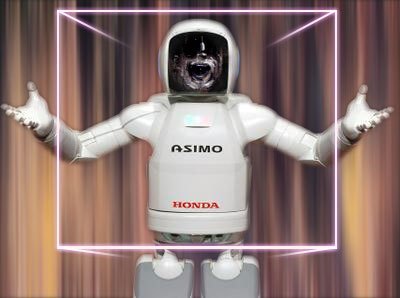
Rob Beschizza:
I chanced upon an ancient backup of my RSS feed subscriptions, a cold hard stone of data from my time at Wired in the mid-2000s. The last-modified date on the file is December 2007. I wiped my feeds upon coming to Boing Boing thenabouts: a fresh start and a new perspective.
What I found, over 212 mostly-defunct sites, is a time capsule of web culture from a bygone age—albeit one tailored to the professional purpose of cranking out blog posts about consumer electronics a decade ago. It's not a picture of a wonderful time before all the horrors of Facebook and Twitter set in. This place is not a place of honor. No highly-esteemed deed is commemorated here. But perhaps some of you might like a quick tour, all the same.
The "Main" folder, which contains 30 feeds, was the stuff I actually wanted (or needed) to read. This set would morph over time. I reckon it's easy to spot 2007's passing obsessions from the enduring interests.
↬ Arts and Letters Daily: a minimalist blog of links about smartypants subjects, a Drudge for those days when I sensed a third digit dimly glowing in my IQ. But for the death of founder Denis Dutton, it's exactly the same as it was in 2007! New items daily, but the RSS feed's dead.
↬ Boing Boing. Still around, I hear.
↬ Brass Goggles. A dead feed for a defunct steampunk blog (the last post was in 2013) though the forums seem well-stocked with new postings.
↬ The Consumerist. Dead feed, dead site. Founded in 2005 by Joel Johnson at Gawker, it was sold to Consumer Reports a few years later, lost its edge there, and was finally shuttered (or summarily executed) just a few weeks ago.
↬ Bibliodyssey. Quiescent. Updated until 2015 with wonderful public-domain book art scans and commentary. A twitter account and tumblr rolled on until just last year. There is a book to remember it by should the bits rot.
↬ jwz. Jamie Zawinski's startling and often hilariously bleak reflections on culture, the internet and working at Netscape during the dotcom boom. This was probably the first blog that led me to visit twice, to see if there was more. And there still is, almost daily.
↬ Proceedings of the Athanasius Kircher Society. Curios and weirdness emerging from the dust and foul fog of old books, forbidden history and the more speculative reaches of science. So dead the domain is squatted. Creator Josh Foer moved on to Atlas Obscura.
↬ The Tweney Review. Personal blog of my last supervisor at Wired, Dylan Tweney, now a communications executive. It's still going strong!
↬ Strange Maps. Dead feed, dead site, though it's still going as a category at Big Think. Similar projects proliferate now on social media; this was the wonderful original. There was a book.
↬ BLDGBLOG. Architecture blog, posting since 2004 with recent if rarer updates. A fine example of tasteful web brutalism, but I'm no longer a big fan of cement boxes and minimalism with a price tag.
↬ Dethroner. A men's self-care and fashion blog, founded by Joel Johnson, of the tweedy kind that became wildly and effortlessly successful not long after he gave up on it.
↬ MocoLoco. This long-running design blog morphed visually into a magazine in 2015. I have no idea why I liked it then, but indie photoblogs' golden age ended long ago and it's good to see some are thriving.
↬ SciFi Scanner. Long-dead AMC channel blog, very likely the work of one or two editors and likely lost to tidal corporate forces rather than any specific failure or event.
↬ Cult of Mac. Apple news site from another Wired News colleague of mine, Leander Kahney, and surely one of the longest-running at this point. Charlie Sorrel, who I hired at Wired to help me write the Gadget blog, still pens articles there.
↬ Ectoplasmosis. After Wired canned its bizarre, brilliant and unacceptably weird Table of Malcontents blog, its editor John Brownlee (who later joined Joel and I in editing Boing Boing Gadgets) and contributor Eliza Gauger founded Ectoplasmosis: the same thing but with no hysterical calls from Conde Nast wondering what the fuck is going on. It was glorious, too: a high-point of baroque indie blogging in the age before Facebook (and I made the original site design). Both editors later moved onto other projects (Magenta, Problem Glyphs); Gauger maintains the site's archives at tumblr. It was last updated in 2014.
↬ Penny Arcade. Then a webcomic; now a webcomic and a media and events empire.
↬ Paul Boutin. While working at Wired News, I'd heard a rumor that he was my supervisor. But I never spoke to him and only ever received a couple of odd emails, so I just got on with the job until Tweney was hired. His site and its feed are long-dead.
↬ Yanko Design. Classic blockquote chum for gadget bloggers.
↬ City Home News. A offbeat Pittburgh News blog, still online but lying fallow since 2009.
↬ Watchismo. Once a key site for wristwatch fans, Watchismo was folded into watches.com a few years ago. A couple of things were posted to the feed in 2017, but its time has obviously passed.
↬ Gizmodo. Much has changed, but it's still one of the best tech blogs.
↬ Engadget. Much has changed, but it's still one of the best tech blogs.
↬ Boing Boing Gadgets. Site's dead, though the feed is technically live as it redirects to our "gadgets" tag. Thousands of URLs there succumbed to bit-rot at some point, but we have plans to merge its database into Boing Boing's and revive them.
↬ Gear Factor. This was the gadget review column at Wired Magazine, separate from the gadget blog I edited because of the longtime corporate divorce between Wired's print and online divisions. This separation had just been resolved at the time I began working there, and the two "sides" -- literally facing offices in the same building -- were slowly being integrated. The feed's dead, but with an obvious successor, Gear.
↬ The Secret Diary of Steve Jobs. Required reading at the time, and very much a thing of its time. Now vaguely repulsive.
↬ i09. This brilliant sci-fi and culture blog deserved more than to end up a tag at Gizmodo.
↬ Science Daily: bland but exhaustive torrent of research news, still cranking along.
The "Essentials" Folder was material I wanted to stay on top of, but with work clearly in mind: the background material for systematically belching out content at a particular point in 2007.
↬ Still alive are The Register, Slashdot, Ars Technica, UMPC Portal (the tiny laptop beat!), PC Watch, Techblog, TechCrunch, UberGizmo, Coolest Gadgets, EFF Breaking News, Retro Thing, CNET Reviews, New Scientist, CNET Crave, and MAKE Magazine.
↬ Dead or quiescent: GigaOm (at least for news), Digg/Apple, Akihabara News, Tokyomango, Inside Comcast, Linux Devices (Update: reincarnated at linuxgizmos.com), and Uneasy Silence.
Of the 23 feeds in the "press releases" folder, 17 are dead. Most of the RSS no-shows are for companies like AMD and Intel, however, who surely still offer feeds at new addresses. Feeds for Palm, Nokia and pre-Dell Alienware are genuine dodos. These were interesting enough companies, 10 years ago.
PR Newswire functions as a veneering service so anyone can pretend to have a big PR department, but it is (was?) also legitimately used by the big players as a platform so I monitored the feeds there. They're still populated, but duplicate one another, and it's all complete garbage now. (It was mostly garbage then.)
My "Gadgets and Tech" folder contained the army of late-2000s blogs capitalizing on the success of Gizmodo, Boing Boing, TechCrunch, et al. Back in the day, these were mostly one (or two) young white men furiously extruding commentary on (or snarky rewrites of) press releases, with lots of duplication and an inchoate but seriously-honored unspoken language of mutual respect and first-mover credit. Those sites that survived oftentimes moved to listicles and such: notionally superior and more original content and certainly more sharable on Facebook, but unreadably boring. However, a few old-timey gadget bloggers are still cranking 'em out' in web 1.5 style. And a few were so specialized they actually had readers who loved them.
Still alive: DailyTech, technabob, CdrInfo.com, EverythingUSB, Extremetech, GearFuse, Gizmag, Gizmodiva, Hacked Gadgets, How to Spot A Psychopath/Dans' Data, MobileBurn, NewLaunches, OhGizmo!, ShinyShiny, Stuff.tv, TechDigest, TechDirt, Boy Genius Report, The Red Ferret Journal, Trusted Reviews, Xataca, DigiTimes, MedGadget, Geekologie, Tom's Hardware, Trendhunter, Japan Today, Digital Trends, All About Symbian (Yes, Symbian!), textually, cellular-news, TreeHugger, dezeen.
Dead: jkkmobile.com, Business Week Online, About PC (why), Afrigadget (unique blog about inventors in Africa, still active on FaceBook), DefenseTech, FosFor (died 2013), Gearlog, Mobile-Review.com (but apparently reborn as a Russian language tech blog!), Robot's Dreams, The Gadgets Weblog, Wireless Watch Japan, Accelerating Future, Techopolis, Mobile Magazine, eHome Upgrade, camcorderinfo.com (Update: it became http://Reviewed.com), Digital Home Thoughts (farewell), WiFi Network News (farewell), Salon: Machinist, Near Future Lab, BotJunkie (twitter), and CNN Gizmos.
I followed 18 categories at Free Patents Online, and the site's still alive, though the RSS feeds haven't had any new items since 2016.
In the "news" folder, my picks were fairly standard stuff: BBC, CNET, digg/technology, PC World, Reuters, International Herald Tribune, and a bunch of Yahoo News feeds. The Digg feed's dead; they died and were reborn.
The "Wired" feed folder comprised all the Wired News blogs of the mid-2000s. All are dead. 27B Stroke 6, Autopia, Danger Room, Epicenter, Gadget Lab, Game|Life, Geekdad, Listening Post, Monkey Bites, Table of Malcontents, Underwire, Wired Science.
These were each basically one writer or two and were generally folded into the established mazagine-side arrangements as the Age of Everyone Emulating Gawker came to an end. The feed for former EIC Chris Anderson's personal blog survives, but hasn't been updated since his era. Still going strong is Bruce Sterling's Beyond the Beyond, albeit rigged as a CMS tag rather than a bona fide site of its own.
Still alive from my 2007 "Science" folder are Bad Astronomy (Phil Plait), Bad Science (Ben Goldacre), Pharyngula (PZ Myers) New Urban Legends, NASA Breaking News, and The Panda's Thumb.
Finally, there's a dedicated "iPhone" folder. This was not just the hottest toy of 2007. It was all that was holy in consumer electronics for half a decade. Gadget blogging never really had a golden age, but the iPhone ended any pretense that there were numerous horses in a race of equal potential. Apple won.
Still alive are 9 to 5 Mac, MacRumors, MacSlash, AppleInsider and Daring Fireball. Dead are TUAW, iPhoneCentral, and the iPhone Dev Wiki.
Of all the sites listed here, I couldn't now be paid but to read a few. So long, 2007.
https://boingboing.net/2017/12/29/my-rss-feeds-from-a-decade-ago.html
12 notes
·
View notes
Text
State of the Union 2019 Commentary
It’s been a week and some change. Let’s talk State of the Union.
First off, I’d like to make a comment on the overall speech theme. Trump spoke of unity and everyone coming together, but that very morning he went to yell at how obstructionist and obnoxious the Democrats were being for not giving him his baby bottle wall. This man, who speaks of himself as the best deal maker in the world, and bragged he’d be able to get everyone to get together and make friends, sort out their differences, when he has done nothing but make demand after demand and concede no ground.
A compromise, Mr. Trump, is two people coming together and agreeing on something they’re both willing to do while conceding parts of what they want. It’s called a surrender if someone gives you everything they want while getting nothing. Dummkopf.
So with that, let’s begin at the beginning. I warn you right now I don’t want to go over every single point he made, but I’ll cover as many of them as I can and comment as needed. There are other commentaries out there, some as soon as the day after, and those are more than cool to have hanging around. I’m sure between all of those you can come up with a total summary of what he said, based on every single word. With that, let’s begin.
As per his theme, he started the speech by calling for unity and cooperation. All well and good for anyone else. We should avoid revenge politics - which is fucking rich coming from him, but whatever. Specifically, he calls congress to concern themselves “with the agenda of the American people” but…
Well, we’ll get to that.
He thanks some WW2 vets and then talks about how he’s interested in “America First.” People have on more than one occasion pointed out that given his actions, he seems to mean “America Only” when he says that, and that should be a premise that is upsetting to everyone but I have no doubt there is a large portion of the population of the American population who are more than happy to ignore the rest of the world. They already do, after all.
He then introduces Buzz Aldrin, saying that we’ll be going to space on American rockets again. And he’s actually, sadly, right there. Back in 2011, the Space Shuttle program was retired, and we’ve been relying on the Russian Soyuz capsule to get us into the space ever since. The successor to the Space Shuttle Program, the Space Launch System, has been slow coming for numerous reasons. It is, however, finally going to be ready to go in 2019 and will perform its first mission in 2020 - sending a craft to Mars. They wanted a rocket that could get a crew to Mars eventually, and the Senate…
Well, let’s just say congress stuck it’s fingers into the Space Launch System so much that it has been derisively called the Senate Launch System, and a lot of astronauts and NASA Engineers are concerned that it is basically a horrible, efficient money sink. Still, as an avid space fanatic, I’m glad we’re making efforts, at least. Though I’d point out that those efforts have been in motion long before he ever got there to direct them. This is, after all, the man that believed we could go to Mars before his first term was out.
He next goes on to talk about the economy, claiming that our middle class is bigger and more prosperous than ever before. This is untrue. While it seems to be complicated, the general consensus is that while the Middle Class has been stable in size, they tend to have less and less, especially in comparison to the upper class. That is where the real problem is, as well. The absolutely ridiculous wealth disparity. Though I get the feeling that removing taxes from private jets is totally gonna help with that. She says, sarcasm frothing in her mouth in a mixture of rage and bitterness.
He then claimed responsibility for the parts of the economic boom that have been happening. First of all, the economy is...not exactly booming. But there are good things happening in it. It’s sort of a whirlygig of insanity, if I’m honest. Now, you’ll hear me say this again a few other times, but I am not all that educated when it comes to economics. Economics is a chaos system and I much prefer stable ones with easy to predict results. Is a thing right or wrong, is this method an effective way of accomplishing the intended goal. Things like that.
That said, I do know a few things, and one of them is that a lot of people who do know a thing or two about economics point out that this economic boom began in 2016, which means it's entirely possible that this is a result of Obama’s policies were responsible, we don’t really know. Maybe Trump did have something to do with it, but it’s often not accurate to blame the problems or successes of an economy on a single thing. So this claim gets a big ol’ stamp of “UNVERIFIABLE” from me.
I can say that wages are not rising, or at least as much as he thinks. The Federal Minimum Wage was not changed since 2009, and lost about 9.6% of its purchasing power because of inflation. While some states have made major strides towards livable minimum wages have been made in places like New York and California, I’d be willing to bet dollars to donuts that if you removed the massive amount of wealth that people like Jeff Bezos make, you’d find that they are stagnant, or even lowering.
There’s a thought for a math rant sometime.
Anyway, he then praises the 5 million people who got off of food stamps. First of all, the number is 3.5 million. Second of all, it’s a bit more complicated than that. To summarize, while the decrease in unemployment is helping, there’s another little niggling thing. There was a provision in the law that basically said you could turn off some of the safety nets if employment rates rose, and a lot of states decided not to pay for those benefits. I won’t argue whether or not that was a right or wrong decision, but I will say you don’t get to wave around the number of people who are off a program as a victory when the reason they’re off it isn’t because they don’t need it, but because they were kicked off it.
We’re the hottest economy in the world, he says! And he’s wrong. I mentioned before that we’re in a weird sort of “Good Things, Bad Things” phase, but I don’t think I need to tell anyone that the stock market has been all over the place, falling and rising considerably at random. Meanwhile, S&P has downgraded America’s credit score. I think we’ve got a problem, and I know we’re not the hottest economy.
He then goes onto say that the unemployment rate for people of color is the lowest it’s ever been. And shockingly, he’s right on this one. Sort of. The Federal Bureau of Labor Statistics shows that the rate of unemployment for hispanic people and black people actually went down, and was at one point the lowest it’s ever been. Asian unemployment has sorta been all over the place. What makes it strange, however, is that each of these groups had a random and sudden spike since November/December of last year, while for whites it’s been pretty stagnant. Last hired, first fired, I guess.
He also talks about the same with disabled people and that is blatantly untrue. While it seems the number of people who qualify for disability also is going up, they’re not getting employed any faster.
I should also mention that even if we could point to one specific thing as responsible for these changes, I doubt it would be the fault of the man who himself wouldn’t house or hire black people.
He also celebrated getting rid of the estate tax. Which yes, he did. That is not necessarily a good thing. He acts like it applies to small businesses and farmers, but it doesn’t. One person said on the matter “If you don’t feel comfortable calling what you own an estate, then you probably aren’t affected by the estate tax.” You and your guilded crotch spawn and protected up to 10 million dollars. Only after that is your wealthy taxed on death, and only to prevent the the existence of a permanent landed gentry. The only people benefiting from the end of the estate tax are literal millionaires, who can afford to give some of that dosh to the community.
He then talks about Obamacare, and how he get rid of the Individual Mandate. He claims this was the most unpopular part of the law, and he’s right, but analysts point out that it’s more complicated then Thing Bad So Get Rid Of. Without the Individual Mandate to get people motivated to apply for coverage, a lot of people simply won’t get insured. Further, the whole point was that forcing the younger people to pay for insurance when they’re less likely to need it helped to add money to the pool that could be used to help cover the people with pre-existing conditions or complications. That said, it’s also a good thing not having people pay for coverage they can’t afford, so...it’s complicated.
Trump then bragged about cutting the most regulations of any President ever, and I won’t deny that he has. I will, however, point out that this is a horrible thing that should concern and frighten all of you. While some of those regulations may seem arbitrary, literally every one of them was written in the blood of some innocent person who died so a corporation could make an extra buck. We’ve already seen an increase in food poisoning and infections and the increase in food recalls since 2013 has been kind of horrifying. Trump has been eagerly cutting regulations to “Pre-1960s” levels. You know, before we had seatbelts. It’s very harmful to cut those regulations, and it needs to stop.
He then says that America has corporations coming back in record numbers. On this, he is also not wrong. The Jobs report was very good, and we should all be happy about that. That said, whether or not he is the one to thank for that is a bit more complicated, as usual. It turns out that some of these gears were set into motion when Obama was in office. Some of them are just the effects of a slow recovery process since the 2009 Recession. That said, they did take a sharp rise in 2017. So yay for him, I guess.
Except, again, if deregulation is how you’re doing this, then you’re doing it wrong. We should not be sacrificing the blood of American people so that a few already stupid wealthy people can get even more stupid wealthy. The reward is not worth the cost.
He then goes on about how we’re the number one producer of oil in the world. This claim is untrue. There has, however, been a boom in oil and natural gas production due to things like the invention of fracking and loosening of regulations that goes all the way back to the Bush Era. The rate is increasing such that by sometime into the 2020s, we will be the greatest producer of oil and natural gas, at least privately. Considering those materials are murdering our planet this is also not good news, but since Global Warming is, of course, a conspiracy cooked up by the Chinese to steal American Jobs, that doesn’t matter. We are also not a net exporter of energy, by the way, but are on are way to becoming one.
Then things get...weird. Everyone starts chanting “U-S-A! U-S-A! U-S-A! U-S-A!” in this really low and creepy tone that I was frankly a bit creeped out by. It was like these people thought they were at a football game and not a session of Congress. Then again, this is my first time really sitting down and paying attention to the State of the Union, so this may be normal. I just didn’t like it.
What should, however, terrify everyone is his next babbling remark. He spends five minutes or so going on a rant about how “If there is going to be peace in legislation, there cannot be war and investigation.” Which, frankly, reminded me of a mafia frontman. “Lovely country you got here, shame if somethin’ were to happen to it. You noisy folks stink’ yah nose into my bosses business makes it real hard for him to keep wild guys like Big Jim ova deya under control. I can’t promise you won’t upset him wid all this.”
Sorry, trumby. You don’t get to talk about the need to stop our adversaries when you may well have been put in office by one.
Ughk, I hate using that word. Adversaries. It makes it sound like we have a boat load of enemies, when in reality we have like, 3 or 4, and otherwise a series of complex political relationships. Like we can’t work together with those people for a better future if we all just calmed the fuck down.
Like they’re not people.
Whatever. There are more important things to worry about.
Like how he goes on to mock the democrats for not approving his nominations. Even though a whole boatload of them are sketchy as fuck, should have never even been approved at all, or were just never filled by Trump in the first place.
Also can I just say that it’s fucking rich hearing aa man like Trump complain about not getting a nominee approved after what his party pulled with the Supreme Court? We call that hypocrisy.
He then goes on to talk about making life easier for prisoners and punishing people who abuse our veterans. Now, I could point out that prison reform was actually Barack Obama’s whole big thing and he passed a lot of laws in that regard, and Trump has not, and Former President Obama also passed VA reform in 2014 that allowed for people who mistreated veterans to be harshly punished. That said, Trump has been making further strides on those initiatives, and in fact his most approved and liked legislation is the First Step Act. These are the sorts of policies that really can make life better for people, and it’s nice to see everyone getting behind them. Ofcoursewecouldfurtherthesegreatstridesbyclosingdownforprofitprisons, andotherthingsthatimcertaindontappealtoarepublicanmindset, but that’s for another day. What I’m saying here is that as much as I don’t like it, I have to admit Trump has done a good. I don’t care who past them, how they developed, they were good things that happened. Yay! Good job Trump, you get a big shiny gold star.
We then move on to the Racist section of the speech. He starts by talking about the Migrant Caravan and I am shocked at how wrong and full of hatred this man is. He claims these refugees are an “onslaught” of illegal aliens when they’re all coming to America to seek asylum. You know, something that’s completely and totally legal. But no, this is an INVADING FORCE of ILLEGAL ALIENS that need to be stopped with 3,750 more Soldiers with GUNS. They managed to make it all the way to the American border with only one small kerfuffle with the Mexican border police, before arriving at the American border not to see Lady Liberty’s open arms welcoming the hopeless and downtrodden, the weary and poor, but instead heavily armed and barricaded troops who would then go on to use tear gas on them. Is that the America we want to show to the world?
Now, to his credit, Trump admits that Immigrants enrich our society - which is entirely true. Yes, there’s a bit of stress on lower-wage jobs when they first arrive, but that’s minimal in comparison to the benefits. Not that saying that to someone who got laid off and replaced with a migrant is no consolation, I fully understand, but there are ways to help these problems. Also, side note, if he believes immigrants are so awesome and enriching to our society, then he would be more than happy to have them enter the country. But the immigration system here is a convoluted mess of insanity that takes forever to get anything done and then occasionally does nothing, and Trump has just been making it worse. Just a thought.
Now I wrote an entire post about the wall, so I won’t go into it too much here. But the wall is an expensive, stupid, and ineffective idea. Drugs aren’t coming through skirmishers who are dodging around the border, they’re coming through ports of entry. The San Diego wall he was talking about isn’t nearly as effective as he pretends, and it didn’t really start working until the entry port in that area was spruced up. Smuggler still break through it all the time, as well, to the point where an area of it is called “Smuggler’s Gulch.” It also has trapped migrants into paying more to cross to the bad guys, taking riskier and more lethal routes, and actually trapping “illegal” migrants in who may want to leave. Most of the time, men would come up, do some work for cash, then go home once they felt they had enough, but now they’re coming, staying, and bringing their families.
Trump also points out that there were people in that room who voted for the wall, but I reckon the immense amount of insanity that came from that previous attempt are why a lot of people don’t want to do it again. Trump says that “No issue better illustrates the divide between America's working class and America's political class” but in truth, 60% of Americans are strongly opposed to the wall. The wall is a lost, stupid cause, and Trump needs to give it up before he hurts himself with his flailing about it.
OH, and just as one last cherry on the cake, it won’t stop sex trafficking either. Most traffickers bring there people in through on legal Visas, which they are then forced to overstay as those visas are held from them. In fact, over 80 anti-trafficking organizations got together to say that Trump's comments on the matter were actually harmful to efforts to stop this stuff.
He then goes on to tell the story of the Maddison family. I honestly don’t remember what it specifically was, because they are just a prop to garner sympathy for his position, and I’d actually be fine with that if the idiot didn’t use it to spread a lie. This family lost ones they love to MS13 members. That’s horrible and tragic and very sad, and I feel for them and wish it hadn’t happened. But acting like this is how every “illegal immigrant” operates is just a flat out lie. While the actual numbers are hard to tell, we know enough to say that if you strip away the illegal crime of coming here when not allowed, “illegal” immigrants commit 16% less crimes then the native-born population. Most of them are just people who want to escape an insane life and live the American Dream. But, see, they’re hispanic, so they can’t. You have to be white to be an American.
So with all of that said, let’s jump ahead to a cute moment where he talks about women taking 53% of the open jobs. Again, not his fault but go off I guess.
He then goes on to celebrate the women in Congress, of which there are more than ever before. Hurrah! I appreciate that little wink and nod, and in fact Donny, you get a gold star for this one too because this one is your fault.
By proxy.
Pretty much every one of those women ran for office because they hated you, your policies, and your stupid ugly face. They’re not there because they like you, they’re there because they want to stop you. So I think I’mma just take that shiny gold star away.
Next, he bounces back to talking about the economy, because Trump can’t focus on a single thing. Again, I won’t say much on this because economics is not my speciality, but people who DO know a thing or two about economics are pretty much in agreement that tariffs are a tool, and not a very good one. The analogy I like to use goes something like this. Imagine tariffs as a double edged knife you’re going to use to stab someone you don’t like. You’re already dealing with a weapon that’s not the safest, but guess what? This one also doesn't have a hilt, or a guard, or a pommel or anything. It’s literally just a long, serrated sheet of iron with a point on one end. So whenever you hit the other guy, you’re cutting yourself too. You can’t not.
Tariffs need to be used with the precision of a scalpel, and only if they’re determined to be the right tool for the job. And that’s without accounting for the unintended consequences like how rich people can probably find a way to avoid tariffs so they hurt the poorer people more, or you know, starting a trade war because the other people can just pass tariffs on you too?! And if any of you think this gigantic flatulating, tiny-handed orange with a racist stick coming out of its ass is capable of “precision” then I have a bridge I’d very much like to sell you.
He also goes on to talk about NAFTA again, and I’m gonna have to plead ignorance on this one. I don’t know if NAFTA is or is not a good deal, or if UMCA is a better one. I don’t know enough about economics and I don’t know enough about the laws themselves. I’m at least grateful the idiot didn’t cancel NAFTA before enstating UMCA, and those people who are smarter than me I keep talking about say that Mexico and Canada may not be in a mood to negotiate a new trade deal. So who knows. I’m not going to say much else on the matter.
So then we move on to infrastructure brieful. Trump talks about how it’s crumbling and needs repair, and he’s not wrong. The infrastructure report card for the US is, frankly, abysmal. But this begins a trend on a couple of topics.
He goes on to eagerly talk about how we need to improve health care, and lower drug prices! That we’re going to get rid of HIV in 10 years! That Childhood Cancer is going to be eradicated! Everyone gets paid family leave! All this wonderful pie-in-the-sky stuff that is super cool to hear him talk about, and I’d be totally behind him….
If he were actually doing anything on these matters. Trump talks a big game on these things, but hasn’t made any moves. Whenever he starts to, his business buddies step in and explain why they’re going to lose money and he stops.
So! He then moves on to talk about the legislation in New York that protects women’s rights to get an abortion anytime and how horrible it is that they’re murdering babies.
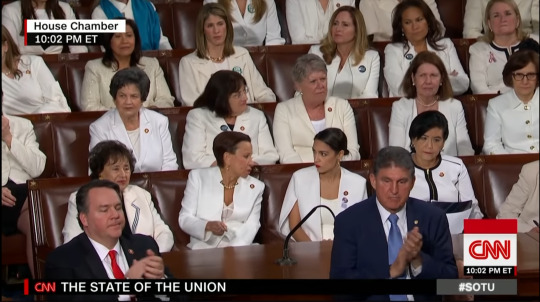
I think the response the white-clade congress women gave was the best.
I think the look on Angela Ocasio-Cortez’s face is the best, but the look on Angelia Ocasio-Cortez’s face and I think that’s Kathleen Rice giving the stink eye.
I don’t want to get into a debate about abortion, because that really is the best way to get everyone everywhere ever to hate you. I will say this, however. The law more or less only applies to pregnancies that would kill the mother or if the baby is already dead, and it wouldn’t matter if it didn’t.
Do you honestly think a person is going to go throw eight months of the most harrowing and obnoxious process the human body is capable of performing and then just suddenly decide “You know what? I don’t want this baby anymore.” If you’re that far along you either wanted the baby and were willing to suffer for it, or you never wanted the baby and were prevented from getting an abortion when it would’ve been kinder. The law isn’t about murdering babies, it's about letting women have control over themselves and their bodies. Acting like it’s some horrible evil that happened just makes you look dumb.
We then go onto nonsense about military bravado. Trump yammered about how he forced our allies to pay their fair share in NATO - which is honestly a kettle of fish I want to talk about in its own post, but suffice it to say it’s interesting everything he stresses and hates NATO for makes matters easier for Putin.
The real thing I want to talk about is the nuclear treaty he eventually meanders into like a toddler into a wall. Look, I’m not going to pretend that I understand the intricate diplomatics of nuclear negotiations, but even I know that YOU DO NOT ARBITRARILY CANCEL A TREATY THAT PREVENTS NUKES FROM BEING BUILT. You want an arms race?! This is how you get an arms race!
So what if Russia is “flaunting it” and ignoring it? I do not give one single solitary flying fuck. You negotiate a treaty that makes them suffer consequences - or better yet, stop not making them suffer the consequences they’re supposed to when they pull that shit - and you do it while the other treaty is still active. The last thing we need right now is a nuclear war and I don’t want to fucking hear that you’re taking Russia out of a treaty that at least somewhat contained them.
This man is going to get us all killed, I swear to Athena.
He then starts saying that “oh, the world would be in Nuclear war with South Korea if it weren’t for him, and he’s just wrong. I mean I know the nature of reality is such that there’s no real way to measure the tiny micro changes in the fabric of events that could lead to a given result, but I can say for damn sure that North Korea became more aggressive after Trump took office, and that their nuclear problem is largely for deterrent purposes because they are afraid of. Not that anyone should have nuclear weapons. Point is, this claim is bullshit, and I don’t need to source anything because it’s fantastical.
Next up is Venezuela, and his whole...spat against socialism. First of all, socialism is not responsible for the collapse of Venezuela because it wasn’t socialist. Those close to Maduro call his state a narco mafia government under the guise of socialism. It’s complicated - like everything else here is - but it can basically be summarized that instead of gathering material in the government and using it to support the people, it gave all that to big companies and then just kept taking and taking. Because that’s what unregulated big companies do. There was no market.
That said, even if Venezuela had been socialist in the truest sense, that doesn’t mean that socialist policies couldn’t work or shouldn’t be used. When applied properly (with a mix of capitalism, in my opinion), you can create a prosperous country that takes care of everyone by skimming off the top of those who have much and giving to those who have little. We’ve seen it work in different circumstances before, and even an entire country that made it work up until Stalin decided to take it over and twist its efficacy into bullshit.
He then talks a bit about Israel and Palestine, which is another basket of snakes I refuse to open other then to say that treating it as casually as he does is stupid. Israel and weird creepy end times Christians are the only people who actually don’t want a two-state solution. Sooo yeah.
Next, he speaks on how he’s done with the war against ISIS and that the troops are coming home, but fails to give a time frame and talks about not fighting an endless war - something I’d be more willing to believe if he wasn’t spewing money into the military like a sick man on laxatives does into the toilet. But whatever, I’m all for both of those things, so if he does them I’ll compliment him accordingly and apologize for not believing him.
The last thing I really want to talk about is how he brags about getting out of the Iran Nuclear Deal. That was actually working just fine and had finally squeezed Iran into cooperating and now they don’t have to while still giving them breathing room for their civilian population. But that is a complicated matter, that, again, is more difficult to ascertain than “Thing Good” or “Thing Bad.”
From there, the rest of the speech is just chest beating and bravado. Emotional appeals about how great America is and how free we are and blah blaah blaaah. I actually don’t have a problem with this - the swelling call to action at the end of the speech is a very effective tool and it’s not like I haven’t used emotional manipulation myself, even in this very article. But the point is that it’s not factual - it’s not meant to be criticized as a series of claims or even critiqued at all. It’s bravado, pure and simple. Trump is good at it, and he did a good job with it here.
Before I conclude though, I just want to quickly comment on one thing. Him derailing antisemitism is hilarious. You’re like 4 years too late on that bro.
Anyway, conclusions.
Most of the problems with this speech can be summed up with “It’s not that simple, idiot.” The world is a complicated place and Trump tried to simplify it. His ignorance to fully explain the complexities - or, as the case may be, even bother to understand them - has led him to misinform people live on TV. I’m not going to spend time talking about whether it was deliberate or not, I have long since given up and trying to determine where Trump’s evil ends and his stupid begins.
I will say that I give him one or two points for doing the things right, but given how much else was disgusting and, frankly, hateful, it’s very much “even a broken clock is right twice a day” type thing. Trump’s state of the Union was a cavalcade of lies and misjudgements, interspaced with bravado and unnecessary calls to his god. This is a secular nation, people. I should not hear about God no less than 4 times in the most important speech the country makes.
Hopefully he’ll be out of office soon.
3 notes
·
View notes
Text
Hello! This is a raw-text paste of the huge amount of thoughts I provided for the recent interview with The Guardian - it was written by Simon Parkin, who is superb - so I really recommend you go and read that first. https://www.theguardian.com/technology/2018/sep/08/youtube-stars-burnout-fun-bleak-stressed (This is all copy-pasted via my phone, and I haven't edited it as I would an article - it may be full of errors and it's definitely formatted quite badly. Ta!) *** I first properly got into YouTube after taking a job to head up a channel for a video game website, after working as a print journalist for a couple of years. Now I do my own thing and run a couple of channels, which collectively have just over 150,000 subscribers. It's pretty much a full-time job for me, and has been for just over 5 years. YouTube has been incredible in terms of creating opportunities - with low budget equipment and software I was able to create work that could easily reach thousands of people. Five or six years ago it felt very freeing - a system that allowed quality to naturally find audiences without having to go through gatekeepers. The sheer scale of the numbers you're looking at are the main thing - a handful of written pieces I've worked on have been read by more than a million people, but when videos go viral it's something quite different: one of my earliest, biggest hits was watched 5 million times in just a few days. I'm admittedly wary of that level of success now, and actively try to avoid "going viral" - but the brief explosion of mild internet fame I achieved in 2013 has allowed me some unbelievable freedoms: a small handful of that audience has kindly followed everything else I've done since, and I've managed to shift my YouTube career into something that feels sustainable - both financially and mentally. The channel I worked for blew up pretty quickly - after a handful of viral hits, I kept plugging at creating new regular content. YouTube is very strange in that it's not enough to simply create great things - most audiences expect consistency and frequency. If you're a channel looking to grow, this means both playing to the gallery of the followers you've got as well as pleasing the whims of "the algorithm". As a platform funded by advertising - of which Google take a healthy cut - YouTube's algorithms promote the videos that best suit the needs of those adverts. Because of that, real success on YouTube requires creators to jump through a series of constantly changing hoops: changing the upload frequency and duration of their videos to better align with the current criteria, in the hopes of seeing their work being fed more frequently to users who haven't seen their work before - or even, grimly, having their work being seen more frequently by those who already subscribe to their channels. I find the idea of chasing algorithms a frankly miserable starting point for creative work, however, so whilst I'm acutely aware of how to achieve success on YouTube the process that leads to it seems depressingly dull. There's a bleakly cybernetic tone to it all - sci-fi has mostly presumed that transhumanism would see technology being integrated into humans, but the zeal with which people aim to please algorithms suggests we're going to save a fortune on futuristic surgeries. What we're seeing a lot of these days is people using services like Patreon to get around the requirements of YouTube's algorithms, allowing people to make a living without having to achieve huge amounts of video views. Over the past few years it became a lot tougher for a lot of people to make a living from advertising on YouTube - mainly because the automated algorithms were whacking adverts on fairly inappropriate stuff - it was a Wild West situation, and every gold rush eventually ends. A lot of people have moved over to Twitch, where it's currently much easier to make a bunch of money - but the person costs involved are not insubstantial: there's a real difference between uploading videos and putting yourself out there, live, every day. I think if you're someone who really cares about putting on a good performance, these platforms end up being vampiric - always asking you for just a bit more until you've nothing left to give. For people who really care about their work, it's absolutely an unhealthy ecosystem. The sense that you should always be working is an absolute killer. YouTube very much has its own culture: people talk a lot about the community they have on *their* channel, but in truth YouTube itself *is* the community, and the tone and expectations of that wider community are far from ideal, to say the least. Knowing that working more could earn you more money is a standard freelancer anxiety, but with YouTube it's more the fear that if you take a break you might lose it all. Riding on the wave of success requires consistency, and with a fresh supply of wannabe stars toiling to find an audience on these platforms it's incredibly easy to slip off the radar - to lose favour with the algorithms that gave you your wings. I worry a lot about the health of many young people trying to find success on these platforms today - a nasty side-effect of algorithm-led content creation is that creators themselves are largely disposable: churn until you burn out, get replaced by three people doing the exact same thing. A crucial truth about internet culture that we've yet to fully appreciate, I think, is that human brains really aren't designed to be interacting with hundreds of people every day. When you've got thousands of people giving you direct feedback on your work, you really get the sense that something in your mind somewhere just snaps - we just aren't built to handle empathy and sympathy on scales of that level. Critical feedback is essential for growth - but it also takes time to properly absorb it. When you've got new strangers every day launching into a fresh intervention, your capacity for reflection goes right in the bin. "You aren't making enough videos". "You're wrong." "You used to be funnier." "You've let me down." These comments only represent a tiny fraction of your audience - most of whom will hopefully be positive and supportive - but the human brain is rubbish at numbers: you don't see ten negative bits of feedback as a fraction, you envision ten people you've really disappointed. When this becomes a regular occurrence - and you're already ploughing ahead making the next thing - you don't have the time or capacity to work towards any legitimate sense of closure, so you either get upset or angry and dismissive. A thing I've experienced that seems to be common is the way that your brain gets so used to these negative comments that it starts to automatically invent them while you're working - I suspect it's a kind of self-defence mechanism, helping you to catch potentially contentious aspects of your work, or things that might easily be misinterpreted. I definitely think this process does help with minimising negative feedback in the actual work, but if it means you're still living through the experience of that negativity - despite it being fictional - is that actually any better? One of the great things about supporting my work through Patreon is it allows me to work at a pace that actually provides room for reflection: I currently make one Cool Ghosts video once every two or three months: it's a broadcast-quality show that's deeply strange, and we take as long as we need to create it. It's the best work I've ever done, but I still feel the constant guilt that I'm not doing enough - I'm not working hard enough. Patreon allows people to work without the worry of getting enough views to make money from adverts, but unfortunately just creates a new strain of stress: You look at how much money you're earning every month, and worry that you aren't doing enough work to justify that figure. But the harder you work, the more that figure is likely to increase - so it's an impossible carrot-on-a-stick situation. Even when you're working as hard as you can, it's so easy to feel like you should be doing more. The first time I really experienced burnout was at the end of 2013. I'd taken a YouTube channel from 1,000 subscribers to 90,000 in just under a year, and my work had caught the attention of Charlie Brooker - leading to an incredible opportunity to work on a one-off show about video games. Trying to juggle that alongside my main YouTube job had me working 18-20 hour days for about 3 weeks, after which point I felt exhausted and frazzled in a way that weirdly seemed totally impervious to rest. Looking back now, I'd clearly been burning out for months prior to that: I looked pale, gaunt - my work had become increasingly rushed, increasingly acerbic in tone. Worryingly, this didn't affect my popularity - one of the most toxic things I've discovered about making content online is that the points at which you're breaking down, being slowly consumed by frustration, are the points at which the algorithms love you the most. "Divisive" content is the king of online media in 2018, and YouTube heavily boosts all content that causes people to get riled up. Explaining why you hate stuff gets you 10 times as much traffic as explaining why you love something - but it also means that the commentary you're dealing with is consistently angry. I don't think it's possible to exist in that space without the stress from that negativity bleeding back into your work: Anger is like a virus - it's fantastic for keeping audiences engaged, but it also motivates creators to better serve the algorithm: working and uploading in a rash, rapid fashion. It's why you see YouTube politically so dominated by right-wing creators - introspection, balance, empathy and care are all values diametrically opposed the platform's core values of More and Now. I think it's possible for creators to be maintained by that anger - nourished by the stuff - for months, years, possibly indefinitely. You see that so much on YouTube these days - people who've slipped into a deeply unhealthy place, keeping it together on a weekly basis by channelling that anger into exponential success. It's like one of those coins spinning around those circular charity things - escalating in a loop as they gently slide towards the void. Burnout happens at the point at which you pause, and I think that anger effectively allows people to maintain velocity for quite a long time. Over the past few years burnout has been more frequent and more serious - my wife was diagnosed with a rare form of cancer in 2014, and since then I've been mentally wobbly in a way which is frequently incompatible with living on the internet. Still though, I think I was burning out perfectly well without that - I spent my twenties working ceaselessly, feeling invincible and boundless. And honestly, I was. Right up until the point where I wasn't. I really worry about young people devoting their lives to platforms like YouTube and Twitch - because when you're young? You absolutely can. You've got the energy and focus to work incredibly long hours, you've got very few responsibilities to take your attention away from work, and - perhaps most importantly - you've likely still got a solid social circle, friendships that aren't difficult to maintain. The reality changes sharply when you get a bit older: your energy levels start to flake out, the stress you've put yourself under has started to damage you physically - my thyroid stopped working properly in 2016, and I've developed frequent patches of anxiety and depression. What starts out as being the most fun job imaginable - getting paid to sit and play videogames all day - can slide into something that feels deeply bleak and lonely: sitting alone for hours playing games and making videos is understandably aspirational when you're a teenager, but as an adult it's a cocktail for disastrous mental health. Suddenly in your thirties everyone gets busy - commitments make friendships harder, and the perception of success & having a "dream job" can slightly poison the way that friends treat you - leaving you understandably uneasy about complaining about your situation. It's this social aspect that leads to some of the biggest issues we're seeing with YouTube: if your life becomes so defined by the platform that you don't really have the time for a life outside of it, it's easy to double down on the relationship you have with your audience. This idea of being friends with your fans is inherently unbalanced, and a phenomenal source of power that many take advantage of with incredible cynicism. Perhaps worse than this, though, is the side-effect of creators having largely grown up being socialised within a constant feedback loop: the things you say and do on your channel define the behaviours of your community, but the behaviour of your community also defines your ideas of what is and isn't OK. It's unsurprising to see people who've spent most of their adult lives working on YouTube having automatically hoovered up some awful characteristics and worldviews from the platforms they exist on - it's a factory line that predictably churns out half-baked, bigoted variations of Peter Pan. I'm still trying to learn how to switch off, even now when I've fully escaped the churn. I think once you've immersed yourself fully into the Content-Creation mindset, it becomes pretty hardwired into your head. I'm mainly thankful though that I approached it as an adult - I think that without the wider perspective of previous work, I maybe wouldn't have realised how toxic it was. I think it's definitely possible to be successful without it taking over your life, providing you know what success looks like. If you're brilliant at what you do and you do something unusual, eventually you'll find an audience. If you stay true to what you love and remain honest with the people who love what you do, it's entirely possible to make a decent living without devoting your entire life to this stuff - if you care about your long-term happiness rather than just a short-term boost of cash, I honestly think it's the only real option. I've never had any formal relationship with YouTube itself, but I've never been impressed by the advice it gives creators. Emphasis is always firmly placed on growth - how to boost the size of your audience, how to get the most out of promotion, how best to "engage" with your community. I've always felt deeply uneasy about the way these things sit side by side: spend extra time making your fans feel loved - it's very an effective way of boosting your income. Patreon in many ways has only amplified that, with one popular company going so far as to label those who pay them monthly as their "best friends". It's incredibly cynical behaviour, but even when genuine it doesn't feel healthy - for many creators it seems from afar that their community has effectively become their main support network - that's an awful lot of eggs to put in one basket. We've seen cursory mental health advice popping up on the platform over the last year or so, but it feels far from sincere: encouraging creators to "take a break!" is pretty laughable when coming from the mouth of a system that actively promotes quantity over quality. There's no sense of responsibility for the culture that they've created - no good advice for dealing with the pitfalls that most people will have to deal with. Steady growth is great, for example, but what happens when growth explodes? When something goes viral? On paper that situation is 100% great, but in reality you're suddenly dealing with a vast, new audience - perhaps an audience that differs in tone to the one you're used to. What happens if the size of this new audience actively swamps the community you had before, leaving you suddenly creating videos for an audience you don't necessarily even like? Fame is the toxic by-product of success, and these platforms allow people to achieve fame quite suddenly - the realities of that are a double-edged sword. I think it's important that young people know it's OK to be unhappy whilst also a success: YouTube stars are always loved best when endlessly thankful for how lucky they are, but the harsh truth is that working on YouTube is just another form of job - you're allowed to decide that you actually don't like it, even if everyone you know keeps telling you that you've got the greatest job in the world. If you're not having a great time doing it, there's literally no point in doing it at all - don't let the demands of the audiences of algorithms steer your life into a position where it's no longer fun. It's important to be wary of rapid growth: if 50,000 people suddenly turn up on your YouTube channel, the obvious reaction is to be thankful and thrilled. If 50,000 people turned up outside your house? You'd probably hold off on opening the champagne until you'd worked out why. Finally, recognise that if you become mildly famous - your relationships with those around you will change. Don't let your desire for internet success get in the way of real-life relationships: the impossible-sounding truth about growing older is that it's remarkably easy to go from having loads of friends to realising you've actually only got 4. Being lonely and successful is a terrible combination, and one that seems to creep up on a lot of people without much warning.
15 notes
·
View notes
Text
@alsosprachvelociraptor reblogged your post:
lmao this shit is old as balls but i’m gonna answer it anyway...
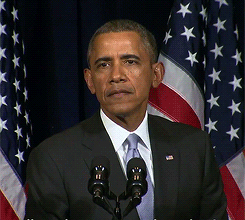
While your defense of Paul Kaye is... um... an excellent one and very... fervent, I honestly have absolutely no clue why on god’s green earth you decided to reblog a 6-year-old post to do so.
...so just shut up and stop screaming at nothing. i wished i didn’t see this post go around on tumblr anymore and at the time i just decided to say nothing, but i won’t shut up anymore.
We have shut up and stopped screaming at nothing! More than half a decade ago! That post hasn’t gone around tumblr since the week it was written in 2012. Two American presidential elections have happened since that post was written. 5 seasons of GoT have passed since that post was written. Nobody has commented on that post in (again) 6 years, and the only person to reblog since 2012 was in 2015 without even tag commentary. Nobody’s cared about Thoros’s casting since 2012. Maybe you saw the post at the time it was made (when you were 14???) but even your own blog was created in 2014, 2 years after this post was written.
I mean, who the hell do you think you’re talking to? That post had only 25 notes before you reblogged it. Half the people who said anything on that post are deactivated accounts, and most of the rest inactive. The OP @panamanianmoon has gone private and I don’t think has touched any part of the fandom in years. Me? I thought Paul Kaye might be good despite the wank (and tried to point out book!Thoros isn’t described as a POC so it’s not whitewashing), and haven’t talked about show!Thoros since 2013. I personally have tried to avoid anything GoT since 2015. I don’t give a flying fuck about GoT casting of anybody anymore, especially not casting that happened in 2012 for a character that went off the rails in 2013 and (I’m told) died last year!
Truly, I can’t see any reason why you dug this post out of its long buried grave and brought it back from the dead to defend your beloved actor. Even Thoros himself didn’t want to resurrect things when they’d been dead only three weeks.
If you couldn’t shut up anymore, if you needed to go all Paul Defense Squad on the horrible terrible “ugh he’s white and looks like an action hero” statements made 6 years ago by long-deleted tumblr’ers, you could have made your own post to do so. Just saying.
Although, hey, thanks for one thing at least. If you hadn’t necro’ed this post, I’d’ve never have found out that the supposed “first Thoros”, Asim Ahmad, is a con artist and serial fake IMDB profile creator who very certainly was never ever cast in the first place. Life is strange...
#alsosprachvelociraptor#thoros of myr#paul kaye#asim ahmad#what the actual fuck#oh fandom#wank wank wank#necromancers#worse than qyburn with this post honestly#2012! 25 notes!#also my god that asim guy lololol#mfw
21 notes
·
View notes
Text
The Peculiar Gentrification of the Comedy Venue
“Even if they don’t call it gentrification, and even if they don’t understand the economics underlying it, I think people have subconsciously learned the consequence of an unregulated land system: a coffee shop is not just a place to get a cup of coffee, and a new streetcar is not just transit. Both are signs that your neighborhood will all of a sudden be valuable real estate, and therefore you might not be able to live in it.” – Peter Moskovitz, How To Kill a City
I began doing stand-up comedy in 2006 in Columbus, Ohio. There were two open mics: one at an Ohio State campus bar, The Scarlet and Grey Café, and one at a long-time bar in not necessarily the greatest neighborhood in the city but not the worst either, the St. James Tavern. The comedy club was (and still is) located in a gargantuan suburban mall. Stand-up comedy and its venues at the time were synonymous with the environment of the city and it trickled down to its comedians. Comedians of the city in 2006 gladly hit these bar open mics to get better but they truly yearned to work the comedy club and be a part of a system that was technically outside of the city.
I lived near the Ohio State campus and just a block away from The Scarlet and Grey Café in my first year doing comedy. I then moved to a more suburban area that was still within the city limits for 2 years. I then moved to the Short North for 4 years where I again lived just a block away from an open mic, now at The Surly Girl Saloon, and our premiere mic in the scene. When I left the Short North, I moved to Franklin Park, and the vast changes that occurred within the city and its living spaces prompted me to ultimately buy a condo back in that same suburban area within the city limits that I lived in years earlier. Ultimately, when in Franklin Park, I was overpaying for a not great place in a not great neighborhood and so I figured I might as well use that money on a down payment on a place on my own. That is what Columbus had become by 2013. The demand involved and the rents were starting to not make sense especially given we were just a few years removed from the subprime mortgage crisis.
In the same sense, this is what has happened to stand-up comedy over the same period of time. Independent comedy within Columbus and many cities across the country began to thrive as well. In Columbus, we could attribute that to our talent but we also must accept that it should be attributed to the wide array of venues that were popping up in the city’s neighborhoods and the influx of younger people to these neighborhoods. There was a huge amount of money flooding into neighborhoods like The Short North, Victorian Village, Italian Village, Clintonville, and Grandview and even now neighborhoods were being talked about in the city that I didn’t even know had names. Columbus was changing and so too ultimately was stand-up comedy.
It’s essential that I as well as my many fellow stand-up comedians accept the fact that we are “gentrifiers” that are a part of gentrification. We move into cities and occupy the neighborhoods that we can afford. We run shows in these cities in the venues that have taken over these neighborhoods thanks to the flood of money that has come in. Gentrification pushes everyone down a rung while the people at the top make the most money. It’s not really our fault. It’s not really the bar or restaurant owner’s fault. But even we as both people and as comedians are “gentrifiers” and the “gentrifiers” that happen to now be near the lowest rung of gentrification.
Stand-up comedy in 2006 still heavily relied on the comedy club. “Alternative rooms” and “alternative comedy” existed but it was something still felt in the major cities particularly Los Angeles and New York. Nevertheless, my generation grew up on the comedy that emerged from comedians who thrived in these alternative spaces. As a result, it’s no surprise that a shift in the nature of how the performance of stand-up comedy was done occurred following 2006. It also isn’t a surprise that “alternative rooms” became more appealing for us as comedians as such spaces became open in hip neighborhoods with the post-housing crisis rise in gentrification. For my generation of performers and our audiences, “alternative rooms” have now become the mainstream. Comedy clubs in malls charging $8 a beer and $20 for an entrée have been replaced by shows in breweries and hip bars and even people’s backyards. It’s more appealing to draw people more into comedy and willing to experience it anywhere than it is to perform for people who know nothing about comedy but want to come out to experience a “fun night out” at the comedy club.
Stand-up comedy and activism have now become interwoven as I have written about previously. There are comedians that feel their comedy has a political or social message. That is fine but we all as comedians must ask ourselves what our place is in activism when we continue to play an active role as “gentrifiers.” There is a certain irony to providing “woke” commentary and doing so in a brewery in a hip neighborhood in a city--a space that played a role in pushing out the poor individuals that once lived in that neighborhood. Stand-up comedy is meant to entertain but it’s also meant to upend those in power and, at our most base level, we are still actively sharing a role at the lowest rung with gentrification.
The many breweries or bars or even backyards that we are now performing in at cities across the country likely have been built on corporate greed. It may have been the city looking to fill in a once poor area with hip bars to attract a young, white population. It may have been landlords increasing rents to fulfill that same young, white population entering that neighborhood. But the reality is we as comedians are “gentrifiers” telling jokes in a hip, gentrified place for audience members who are likely worse off “gentrifiers” than we are because these are the only aspects to their neighborhood that they experience.
Stand-up comedians often complain about being broke and understandably so. Artists have never been paid well and the gap between those at the top and those just attempting to make a living at it are drastic. But, even within the gentrification of comedy and its venues, we are still lowest in the pecking order. The city and its government officials are making a lot of money. The venue owners of these spaces are likely making money as long as they can afford the rising rent. The performers in these venues still aren’t making much of anything and they are doing so within venues that flooded money into the area in order for us to now be the poorest people of the neighborhood who are desperately trying to validate our art. In order to be funny and in order to “accomplish our dreams,” we have also been colonizers.

This photo was taken at a bar that no longer exists in The Continent in Columbus. Strangely enough, of all the neighborhoods that are getting revived in Columbus, no one still wants to go to The Continent.
I don’t have a solution for this within comedy. Gentrification is much bigger than someone on a stage saying funny stuff to a bunch of people drinking IPAs and eating ramen. I live and run a show in Highland Park in Los Angeles and I’m aware of gentrification and attempting to address it more than just being a comedian who lives here and is “trying to make it.” I moved to Highland Park because I could afford it and I liked that I was able to walk to places and it was a close drive to my cousin’s house. It already was on its way with gentrification otherwise I likely never would have arrived and in the 2.5 years since I’ve been there it only intensifies. But I try to understand the history of the neighborhood, embrace it, and preserve it. I interact with my neighbors. I play basketball at the recreation center and meet others or support the businesses that have long been there. This still isn’t enough. This still doesn’t take away from being a “gentrifier” or finding some meaninglessness in comedy knowing its small impact in the bigger business components that affected this neighborhood and the many neighborhoods I lived and performed in not just in Columbus but in cities across the country.
We now have many people in comedy that are supposed activists. We have many people in comedy that supposedly loathe Donald Trump, who is more an icon of real estate than he is of politics. We have many people in comedy that supposedly loathe our current government. If so, then it is necessary to come to grips with this reality of comedy’s interplay with business, gentrification, and the city, and to ask ourselves as comedians: how exactly do we deal with that?
The comedy clubs still exist and are relevant but they have now become a primarily suburban experience across the country. The average “Millennial” is not likely to go to the comedy club unless they are a fan of the specific comedian who is there headlining. Otherwise, they are more likely to interact with comedy at these spaces in the city neighborhoods that they live in: the breweries, the coffee shops, or even their friend’s house.
The Scarlet and Grey Café no longer exists and while it has been replaced by another bar, Threes Above High, the campus area of Ohio State specifically on High Street has changed dramatically. The area in which the St. James Tavern was has as well. Surly Girl is no longer there and The Short North is constantly being built up more and more each time I visit. People sit around and bemoan what once was of the neighborhoods or the city they once lived in while doing actually nothing and watching as a youth culture enters bringing a suburban, selfish mindset into the city over a community one.
The comedian and other artists have now replaced the historically lower income individuals of these neighborhoods. Those individuals are now getting pushed out to the suburbs or just don’t have a home. What was once appealing for a previous generation is now not for the current one just as the newer comedians don’t necessarily flock to the club as much as they do to creating their own pop-up shows in the spaces they rent or give business to where the lower income individuals once occupied.
It simply begs the question: if the comedian is now one of the artists at the lowest rung of gentrification in a neighborhood, as long as gentrification persists and the neighborhoods I lived in (currently Highland Park, the Short North in Columbus, etc.) continue to get richer and richer and more unrecognizable, at what point do the comedians and artists fall off the lowest rung and where do they go?
#gentrification#comedy#stand up comedy#comedian#how to kill a city#columbus#short north#peter moskovitz#evicted#highland park#los angeles#la
1 note
·
View note
Text
CTM CS 2017 Thoughts (aka me getting on my soapbox for a lil bit about all things plot- and character-development-related, regarding all storylines, relationships, and sexualities)
Hi loves -
I know there are lots of opinions on the Christmas Special floating around the wonderful world of tumblr, and I respect all of them, and I’d like to add mine to the mix. They are quite long, as you’ll probably notice. Feel free to agree, disagree, or ignore them completely!
First off, my general impression: it was a lovely episode, but with a little less substance than usual. I think they tried to do too much in one ep, and I didn’t feel as connected to the individual storylines of Linda and Mabel - however heartbreaking and impactful they may have been at certain parts. Also, we’ve seen the Christmas-pageant-gone-to-ruins-and-miraculously-resurrected plot one too many times, I believe, and though the final part of the episode was fun, I felt there was a missed opportunity to do something a little different.
Regarding Linda’s story, I thought Vanessa Kirby did a fantastic job displaying the rollercoaster of emotions that that birth involved - both before and after the baby was born. I’m really excited to see what’s in store for Val this season - as we still haven’t learned what her secret is (my guess is she might have had an abortion or a baby out of wedlock that she had to give up, but that’s just wild speculation), and I think Vanessa will do wonderfully well with whatever Heidi gives her. The actress playing Linda was also brilliant, and I had a huge lump in my throat during the whole stillbirth process. I absolutely lost it when the baby started crying in Val’s bag. It was well done for the most part, but as I mentioned before, it was a little difficult to get as invested in Linda’s character because the episode seemed so all over the place in terms of focusing on the recurring characters’ personal lives and rescuing the ill-fated Christmas fête.
Mabel’s plot also somewhat fell victim to this phenomenon, and I wasn’t particularly convinced that Sister J’s handling of the situation was the right thing. Let me preface this by saying that, thankfully, I have never experienced physical or emotional abuse, and I have never been in a situation of support for someone who has, so I am no authority on how to be the best source of support to someone who has suffered something like Mabel and Anthea did. That being said, I found Sister J’s treatment of Anthea to be less than helpful, in that she pushed her to face the demons of her past with such immediacy in an already emotional time. While the reunion of mother and daughter was one that I was glad to see happen, it seemed like Sister J tried to push it on Anthea too soon, and her last remark about Anthea’s family seemed almost to guilt her into seeing her mother again. I don’t believe Anthea was given enough time to process the death of her father and the emotions that brought up again for her, and I think Sister J could have given her more of that time and not used guilt as a tactic to promote her own idea of what reconciliation looked like. As ever, though, I admire CTM’s willingness not to sugarcoat the horrors of domestic abuse and other all-too-common nightmares that people endure in their daily lives, especially in a culture that has become so inured to the existence and impact of sexual assault - something that is rightfully and courageously being challenged by so many people of all genders, and I hope will continue to be so.
The Turners were just a joy (other than Patrick being a bit of a shit who can’t do much without the women in his life). The kids are growing up beautifully, and watching Shelagh with Teddy was like a dream come true. (Watching Shelagh trying to get that girdle on, on the other hand, was a nightmare, but a raucously hilarious one. Laura Main deserves a BAFTA for those twenty seconds alone.)
As for Babs and Tom, I think they’re lovely together, and I just adored Babs’ little hat. She is such a gem. She spreads sunshine wherever she goes, and she makes a great vicar’s wife. Do I sometimes wish she’d branched out a bit and had some more single adventures? Sure I do. But she and Tom seem happy, and I’ll miss her terribly (if not him - I’ve always found him very blah personality-wise, if somewhat pleasant to look at) during her time away.
Trixie is a lovely Nonnatus stalwart, as always, but I fear Christopher is just another Tom - lovely face, but not much beyond handsomeness and chivalry. Am I happy that the female characters in this show are more nuanced than the male ones? Of course I am; that’s as it should be in a show about female power, strength, and love, and I’ve always considered it a point of pride that this show passes the Bechdel test with flying colors. Still, I wonder what this relationship adds to the series if it’s not an escape route for Helen, should she want to take time off - whether to care for her and Jack’s new adorable baby, or to do other projects. Additionally - and this may be overthinking it - I was a little concerned about how much Trix was talking about her own appearance relative to what she thought Christopher wanted. It called to mind the episode with Cathleen Baker, the gal with varicose veins, and I don’t want Trix to dissolve into self-consciousness like that when she’s always been a woman who’s found her looks a source of confidence and independence rather than the sole sign of her worth. That was just a knee-jerk thing in a couple of scenes, but I was happy she was such a great support for Val - as was Sister MJ (of whom I wish we could have seen a little more).
Phyllis Crane. God bless the woman. She was essential as always, and I loved her fingerless gloves. So comfy and stylin’. My snobby ass thought her cop adversary was a bit too much of a caricature, but I was glad to see she’s heading the rota/appointments - not to mention the Cubs - in as fine a fettle as she ever has. Fred and Reggie made for fantastic helpers (especially Reggie in his fabulous hat). Four for you, Phyllis; you go, Phyllis.
Now for the big one - the issue of the missing characters. I’d like to start with Sister Mary Cynthia, whom I missed dearly. With all the buzz about Emerald and Kate (which I’ll get to later, believe me - if you’ve made it this far, I applaud and thank you for dealing with my ramblings), I wasn’t sure if Bryony would be returning this season or if she’d moved onto other projects. For those who might not know, the BBC offers three-year contracts, so the end of the sixth series provided an opportunity for people to take other gigs if they wished to do so. Whether or not Sister MC will be back in this series, I would have liked to have heard a mention of her progress at Northfield, since Heidi and the other writers - not to mention Bryony herself - did such an incredible job of portraying her mental illness and giving that kind of visibility onscreen last season. I think it is important to give some sort of update on her recovery while recognizing that one never truly recovers from the scars that mental illness leaves, though much healing is possible.
In the same vein, we come to Pats and Deels. My darling, darling lesbians. Though I knew that both Emerald and Kate had moved on to other projects - and bully for them - it still came as a blow not to see them in the CS. As with Sister MC, there was a strange gap (not to mention that we haven’t heard hide nor hare from Chummy in donkey’s years), and I was truly disappointed that there was no mention made of where their characters had gone. However, I do not hold with the idea that CTM is being homophobic or participating in queer-baiting. As a queer woman who began watching this series as an unconsciously questioning high-schooler in 2013 - during series two when there was no whiff of gayness to be had - I recognize the value of this show beyond its representation of queer visibility; yet I also acknowledge that, when that visibility did appear, it was instrumental to my understanding of my own sexuality and my ability to come to terms with and to celebrate it as something beautiful, right, and true - even when people I love in my life may not have done so. (Never mind the fact that Emerald - in combination with Dana Scully - finally hit me over the head re my penchant for redheads with perfect skin, cut-glass cheekbones, and an appreciation for a well-tapered pair of slacks).
Please take those rambling sentences to mean that, while I adored Pats’ and Deels’ onscreen relationship and will miss it terribly, the show communicates many messages beyond those sent by that relationship. This program offers beautifully told and righteously argued forms of social commentary, and above all, it is an ensemble show. There is no one central character or relationship, and the writers do their best to balance all of the storylines equally - regarding characters’ personal and professional lives. Would I have liked to have seen more than a kiss from Pats and Deels? Of course I would have, because I’m a deviant heathen who loves a little lady-lovin’ where I can get it. However, do I recognize that it was the 60s and that this show’s primary demographic is fairly geriatric, so representation had to be limited to a certain degree? Of course I do. I think both Pats and Deels were wonderful and nuanced characters - both together and apart - and the writers and actresses did a wonderful job in terms of queer visibility onscreen, even if they could have given us a bit more closure on where the characters had moved on to in the CS.
Which brings me to the question of Val as “the new gay one.” Do I think it would be fabulous if Val turned out to be gay? Absolutely I do. Everything is better when it’s gayer (though every form of relationship and sexuality is valid!). However, do I believe she’s a nuanced character in and of herself who provides an opportunity to bring more visibility of underrepresented forms of identity and background to the fore? Absolutely I do. I don’t feel that queer visibility is an obligation, a chore to be carried out and dispensed with once it’s filled its quota, or brought in just to fill a gap. It should be something that arises as organically as possible because it is something natural, something ever-present no matter the time period, and it should be represented in an honest, true, and - when possible - celebratory way. I do not think Val should simply “replace” the queer element in the show for the sake of filling a perceived void. I’m excited to see what happens with her character this season, irrespective of her sexual proclivities. I’m also excited to meet our new midwife, as she might provide a more regular perspective from a woman of color on the show and remind us of even more ways we can learn from our history and take action to ensure its darkest moments find no repetition in the light of today.
Okay - getting off my soapbox now. I had a lot of feelings about this episode, so thank you for listening (if you, by some miracle, made it down to the bottom, for which I adore you). Would love to hear your thoughts about any of this, and looking forward to seeing what pops up in the tag from all of you. Love to everyone, and excited for the rest of the series to come!
#call the midwife#ctm#call the midwife series 7#ctm series 7#patsy mount#delia busby#turnadette#shelagh turner#patrick turner#sister julienne#sister mary cynthia#valerie dyer#trixie franklin#barbara gilbert#pupcake#patsy x delia#call the midwife christmas special#ctm christmas special
63 notes
·
View notes
Text
20 sports movies we love that will ease your boredom

WireImage
It may be hard to find real sports to watch right now, but there is an ABUNDANCE of great fictional sports at your fingertips.
Televised sports are on hiatus for the foreseeable future. It’s a tough (but obviously necessary) blow, considering we’re all stuck inside with little to do, and sports would be the perfect diversion right about now.
Thankfully, there are hundreds, or possibly thousands, of sports-centric movies available to wile away the hours. Some might even be convincing enough to get you to yell at your screen, or feel the inimitable catharsis that comes from watching your team (the good team, obviously) win.
Below are some of the SB Nation staff’s go-to sports flicks, with information about where to stream them included. The majority are also available to rent via Amazon, YouTube, Google Play and the like.
Hot Rod (2007)
Available on Netflix, Prime and Pluto.
Insofar as failing to jump over things with a moped is a sport, Hot Rod is about sports. It’s an extremely dumb, pleasant movie with no stakes whatsoever, and it is my number one.
— Seth Rosenthal
Yes, it’s hilarious — but even more importantly, it has the ability to absorb you before you realize it and not let your mind wander out of its grasp. Distraction grade: 10 out of 10
— Will Buikema
Creed (2015)
Available to rent
Too many Rocky sequels to count, but this one really engages with the mythos around the character and who gets to take part in that myth. Michael B. Jordan and Tessa Thompson are two of Hollywood’s brightest stars, and while it’s frustrating they were not awarded like Sylvester Stallone for their performances, all three are terrific here. Also: unlike the original Rocky, this movie recognizes that boxing includes dodging and blocking as well as punching!
— Pete Volk
Goon (2011)
Available on Netflix.
You could probably analyze Goon for commentary about how we glorify violence in hockey, or you could sit back and enjoy a genuinely hilarious movie. It has everything you want in a hockey film. There’s a dim-witted but lovable bouncer who gets a chance at a hockey career in the minors, and a grumpy Quebecois prodigy with a physicality issue. There’s gratuitous blood and gore, and Liev Schreiber getting into fights, and a hint of bromance. There are even cameos from former NHL players, and one from current Dallas Stars forward Tyler Seguin in the film’s 2017 sequel, Goon: Last of the Enforcers, which is also on Netflix.
If you don’t mind some exaggerated violence and slapstick comedy (and particularly if that’s what you’re into), I highly recommend it. Plus, the soundtrack slaps.
— Sydney Kuntz
Bend it Like Beckham (2002)
Available on demand with Starz and DirecTV
It’s funny, it’s sweet, and the fact that you’ve definitely seen it before doesn’t mean you shouldn’t watch it again. It made Keira Knightley an international star, and Parminder Nagra picked up the FIFA presidential award. Beyond the film, it represented a crucial moment in David Beckham’s relationship with his country. He’d gone from villain in 1998 after that red card against Argentina, to hero in 2001 after that free kick against Greece. Eight months later this came out, and canonized him as a national treasure.
— Andi Thomas
High Flying Bird (2019)
Available on Netflix
What better to watch during a period without basketball than a movie about basketball personnel that takes place during a time of no basketball? High Flying Bird, shot entirely on iPhone by Steven Soderbergh, follows a top rookie and his ambitious agent during an NBA lockout, as they try and change the owner-heavy economic structure of the NBA.
— Pete Volk
Escape to Victory (1981, also just known as Victory)
Available on demand with Cinemax and DirecTV
Sylvester Stallone is an Allied solider in a Nazi prisoner-of-war camp. So is Michael Caine. In there with them, for some reason, is Pele, Bobby Moore, Ozzy Ardiles, and half of Ipswich Town’s 1981 UEFA Cup winning squad. And wouldn’t you just know it, they have to play an exhibition against a handpicked German side, for reasons of propaganda. Will they escape … to victory?
— Andi Thomas
Goal of the Dead (2014)
Available on Shudder
”Some kind of a riot. They are burning cars.”
”Given the refereeing, no wonder.”
French football superstar Samuel Lorit faces off against his hometown team in a cup game. His formerly adoring fans now all despise him. And then a tainted steroid injection turns pretty much everybody into zombies, straight from the 28 Days Later school of hard-running mouth-frothers. Good blood-soaked fun, if probably a bit too long. But then all films are too long these days. Return of the King won a million Oscars, and that didn’t have a ‘roid-raging zombie kicking a man’s head off his neck and into the goal.
— Andi Thomas
Fighting with My Family (2019)
Available on Prime and Hulu
Maybe the only worthwhile WWE Studios release ever? I’ll await the flame from fans of The Marine 5: Battleground in the comments. What would have otherwise been yet another vanilla sports inspiration story is elevated by a terrific cast, led by newly Oscar-nominated Florence Pugh.
— Pete Volk
The Damned United (2009)
Available to rent
An adaptation of a brilliant but bleak novel about Brian Clough’s doomed spell at Leeds United, the film dispenses with most of the book’s harrowing existential loneliness and discovers a surprisingly soft-hearted buddy story underneath. Michael Sheen disappears uncannily into his role, absolutely nailing Clough’s astringent self-possession, but Colm Meaney almost steals the film as Clough’s nemesis, Don Revie. A reminder that English football, back in the ‘70s, was a strange, drizzly place full of strange, compelling people.
— Andi Thomas
Hoop Dreams (1994)
Available on HBO, Kanopy and DirecTV
One of the best American documentaries. Also one of the best movies about dreams, who crushes them and how they evolve. It is also one of the best movies about race and poverty in America. All in all, this is one of the best movies about the allure and grace of basketball. A phenomenal film!
— Pete Volk
Horse Feathers (1932)
Available via the Internet Archive
I grew up watching the Marx Brothers with my dad, and I would be remiss not to mention this college football-centric classic. Turns out the “amateur” status of college football players was a joke in the 1930s, too!
— Pete Volk
Minding the Gap (2019)
Available on Hulu
Only tangentially about sports, since the group of kids at this documentary’s focus are skateboarders, but this is one of the great modern American documentaries about growing up, difficult friendships and toxic masculinity. Highly, highly recommend.
— Pete Volk
Starship Troopers (1997)
Available on Showtime, CBS All Access, DirecTV and Vudu
There are several reasons Starship Troopers is memorable — the broadly written anti-nationalist commentary! The exploding bugs! The co-ed showers! That one fight scene soundtracked to Mazzy Star’s “Fade Into You,” for some reason! — but space football is the only one that fits with our theme. In the future, America’s favorite sport is played in high school gymnasiums on old wrestling mats. There are no special teams or roughness penalties. The ball is Nerf’s rough approximation of a baked potato wrapped in foil.
Johnny Rico, our protagonist, wins and is escorted off the field a hero. Roughly 20 minutes of film later, he’s left to die on an alien planet. Shit’s real, yo.
— Christian D’Andrea
youtube
Rush (2013)
Available on HBO
If you liked Ford V. Ferrari, you’ll probably love this. Retelling the true story of James Hunt (Chris Hemsworth) and Niki Lauda’s intense Formula 1 rivalry, Rush has fantastic racing scenes and benefits from focusing on the wildly different personalities and approaches of the two rivals.
— Pete Volk
A League of Their Own (1992)
Available on Showtime, and very often randomly on cable
It almost feels redundant to list this classic, which you’ve probably already seen once or dozens of times. But if you have seen it, you know it holds up better than most of the feel-good, strings-swelling-styled sports hagiographies of the 1990s. A more-or-less accurate retelling of a vital and often ignored part of American sports history, conveyed via an all-star cast and too many quotable lines to count. The “hard” may be what makes it great, but there’s nothing hard about watching this iconic and genuinely uplifting movie. (I also wrote more about it here.)
—Natalie Weiner
Speed Racer (2008)
Available to rent
One of my favorite movies of all-time, taking many aesthetic cues from anime and seamlessly bringing them into the live-action world with breathtaking visual effects. Speed Racer is visually explosive and a delight for the senses, with a grounded conflict at its core (a family business getting bought out by a heartless corporation). In my opinion, this is sports + movies in their best balance with each other.
— Pete Volk
The Heart of the Game (2005)
Available to rent
A hardscrabble team works diligently to overcome the odds, with a few twists. The movie centers on a girls basketball team from Roosevelt High School, 10 minutes from where I grew up in Seattle, and the star of the team gets pregnant. Bring tissues.
— Natalie Weiner
Uncut Gems (2019)
Available to rent
No movie better captures the anxiety of being a sports fan, or the bad decisions you make because of your fandom. Also sports luminaries Kevin Garnett and Mike Francesa deliver excellent performances. My favorite 2019 release! Louis wrote more about it here.
— Pete Volk
Undisputed II: Last Man Standing (2006)
Available on Starz and DirecTV
This is the height of me on-my-bullshit, but please allow it: Scott Adkins and Michael Jai White are generational action stars, and this entry in the excellent Undisputed series shows their singular talents at their best. White plays an ex-boxer framed for a crime and sent to prison, where he fights for his freedom in an underground MMA ring. Adkins plays the terrifying Yuri Boyka, the reigning prison champ. This is so up my alley it’s not even funny, and hopefully it’s up yours, too!
— Pete Volk
More Than a Game (2008)
Available on Starz
It’s very easy to take LeBron James for granted. After all, he’s been doing otherworldly things in the NBA for almost two decades now. Sometimes it just seems like he’s always existed, like he’ll just be inevitable forever. At a time when we’re (hopefully temporarily) deprived of watching him play basketball, it’s worth revisiting this great documentary about his origin story. Yes, he overcame seemingly insurmountable odds, but the part that sticks with you is the people around him — those who believed in him completely, and who he has been just as loyal to in return.
— Natalie Weiner
0 notes
Text
Lamb of God Returns From Pet Sematary as Zombie Content
This email is powered by the trouble between metalworkers, AI, scratched CDs and the cloud. Doing strategic design, I’m always navigating tensions around narratives of change, often ostensibly involving “technology” or some desired or feared “disruption”. What do such narratives mean? Is change always good? Is there anything interesting in the detritus left behind? I’m always drawn to ambivalence.
So it’s no surprise that in the wake of Easter, my thoughts hover above the border between death and rebirth, collapse and resurgence, obsolescence and renewal. And as Passover season led into May Day, I was reminded that in order to find new life, we sometimes need to do more than just hustle like good neoliberal subjects, and actually mess up the one around us, like the plagues visited upon Egypt, or industrial action.
I keep thinking of that awesome first-season finale of American Gods: wily old Odin tells Ostara, the ancient pagan goddess of Easter, that she’s sustained only by the meagre echo of Spring festivities that survive in our contemporary chocolate egg rituals. It’s time to demonstrate her true power to the New Gods, he says. So in the devastating penultimate scene, Ostara decides to withdraw Spring from the world, leaving the land withered and gnarled.
[caption align="alignnone" width="980"]
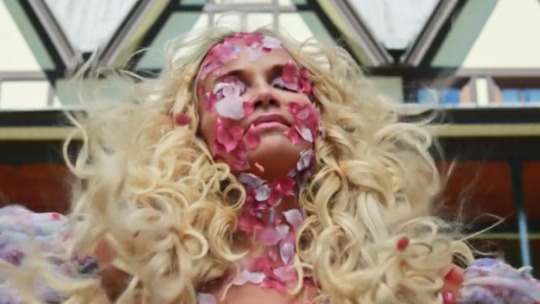
Easter (the ever-delightful Kristin Chenoweth) withdraws her labour.[/caption]
Says Odin:
Tell the believers and the non-believers. Tell them we’ve taken the Spring. They can have it back when they pray for it.
Such chutzpah: it's the Earth, going on fucking strike against the World. So if a Norse god union organiser calls on you next Passover/Easter/May, on which monstrous powers will you draw? How will you Show Them Who You Really Are?
Happy May.
• • •
STATION IDENT: After returning to design after a year away, I find that Everything Now Looks Very Strange Indeed™. This is another one of my updates on restarting a creative practice, with added cultural and design commentary.
(If someone’s forwarded this thing to you in the hope you’ll find it interesting, you can subscribe here to secure my everlasting love. And please, pass it on if you think it might be of interest to anyone.)
🔂🌏 The eternal return of post-human-centred design
Giles Lane from Proboscis took some time to wrestle with my recent ambivalence about human-centred design. Recapping: back in Issue #2 I asked, “Isn’t putting humans at the centre of things what got us into this climate disaster?”, to which Giles replied:
I have a very different understanding of Human Centred Design based on needs rather than desires, including the need to co-exist within a healthy environment/ecosystem. It draws on its 1970s roots, based in radical response to exploitation of people & communities by privileged elites.
Those of us whose work has always embraced a dialogue about ethics, values and been infused by a genuine concern for human centred, participatory design will always be on the periphery of the mainstream.
The thing is, Giles and I don’t have a very different understanding of human-centred design — I completely understand where he’s coming from. When onboarding new designers at Digital Eskimo, I was always at pains to emphasise how the heritage we were inspired by — the Scandinavian participatory design tradition, amongst others — was a truly radical seam of practice that had been papered over by the rather less exciting idea that “listening to customers is common sense for business.” 🤮
[caption align="alignnone" width="980"]

"From Fra Burmeister og Wain's Iron Foundry" by Peder Severin Krøyer, 1885.[/caption]
I would argue that contemporary design methods, whether they acknowledge it or not, owe a massive debt to organisations like the Norwegian Union of Iron and Metalworkers, who in the 1970s were disruptively intervening in debates about automation and computerisation. Rather than simply being “for” or “against” the machines that were threatening to replace them, workers became high-level designers of workplace technology systems. Now that debates about automation have again recurred in this age of AI, we would do well to pay attention to these traditions.
But I’d still argue that in spite of the traditions Giles and I both still cherish, the balloon of “human-centredness” has nonetheless semantically burst, and was never completely tenable in the first place. An analogy: “Third World nationalism” presided over some heroic moments in the struggle against colonial domination, but I nonetheless think that nationalism was never exactly a good thing in the first place, and also tends to yield ever-decreasing returns as a corrective to very real global inequalities.
I think we simply need new beacons for navigating our more-than-human design landscape. These landmarks might include the work of people like Anab Jain from Superflux (see this talk at the IxDA’s Interactions 18 for a good overview of her work), Anne Galloway from the More-Than-Human Lab and others. Let’s all watch that space, and please let me know if you find anything interesting — I’ll feature it here in a future issue.
🐕🤖 Old dogs, new
I was at the City of Sydney’s latest CityTalk, “Our Future With AI and Its Rise In China”: a keynote from Robert Hsiung, chief of the online tech education platform Udacity in China. I found the evening singularly unimpressive. Rather than indulge in wide-eyed liberal panic about Chinese authoritarianism by mining a seam of yellow peril rhetoric, the subsequent conversation went in the other direction entirely, studiously avoiding any discussion about machine learning’s use by the Chinese surveillance state.
Hsiung emphasised the importance of “mastering the machine” to staying relevant as humans in an AI world, citing case studies in which “even” blue collar Chinese workers with a mere secondary education were successfully retrained by Udacity as AI programmers. Sure, they want to democratise tech skills, and I agree that adaption is preferable to sticking one’s head in the sand, but when Hsiung characterises people on society’s periphery as “people who didn’t study enough in school” (actual words used), I’m not seeing Norwegian metalworkers taking power into their own hands. I can’t help but wonder there’s an implicit element of patronising, tut-tutting disciplinary action in this imperative to retrain before the Singularity overwhelms the uninitiated.
Hsiung’s keynote ultimately devolved into a stiff, extended advertisement for Udacity, reminding me of nothing so much as a dystopian propaganda spot for a corporation like Omni Consumer Products in Paul Verhoeven’s RoboCop. If this deeply uninteresting event is the best the city’s public sphere can do on the AI front, Lord Mayor Clover Moore ought to be embarrassed.
💿☠️ Obsoletely nothing
I’m alive / I’m dead
— The Cure, “Killing an Arab”
[caption align="alignnone" width="980"]
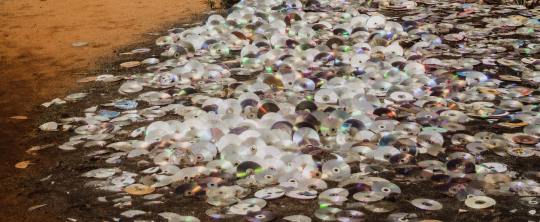
Image by Rishi Deep at Unsplash[/caption]
When I realised not long ago that some of my primary school art students were habitually getting stuck in their creative endeavours, I got them to look for stimulus in unlikely places. “Look at what’s been thrown away at your feet,” I told the class. The next day, my own advice returned to me as a gift.
Local government rubbish cleanups are the rhythmic heavings of the suburbs. A few times a year, we find the unwanted and the outmoded disgorged onto the street (and more often than not, you can find me rummaging through the junk). As I got off the bus that afternoon, an object on the pavement suddenly came into focus as having joined the the ranks of the obsolete: a CD tower. A tall, narrow shelf, made solely to hold a large collection of compact discs.
A few years before, it had been cathode ray tube TVs and VHS tapes on the nature strip. Today, a piece of furniture had lost its one purpose. Next to it, victims of the streaming moment, were endless shiny platters: redundant CDs and DVDs. I felt a pang of melancholy at this diorama of churn, but couldn't muster up any actual nostalgia for CDs. I suspect that I’m not alone in this.
In 1998 I wrote a short science fiction story that touched on the possibility of being nostalgic for media formats that were then only just beginning to be challenged by new forms of media like the Internet. Mirroring what I was then seeing with the fetishisation of vinyl records, my 21st Century protagonist, Sebastian Tan, was a CD fetishist. While I gave Seb the ability to hack into streaming media services to get lasting access to the discrete music files themselves, this streaming pirate still preferred physical media.
And the act of opening the digipak and sliding the antique CD in place was a ritual. Trainspotting. When he first found Silver Rocket, it was a revelation. It was a place. He’d just stood there, soaking it in – the lost garage punk compilations, the late ’90s Skint family, the Anokha artists. All the music physically in the same room. Old silver platters and everything.
Since this was 20 years ago, I don’t remember how much I actually believed how likely “CD fetishism” would actually be in the 21st Century, but the idea certainly seems ridiculous to me now. Naked optical discs like the CD and the DVD seem to be missing the qualities that would guarantee their fetishisation. There’s something fragile, bare and unromantic about them. It strikes me that this is perfectly illustrated by two Kanye West album covers:
[caption align="alignnone" width="980"]
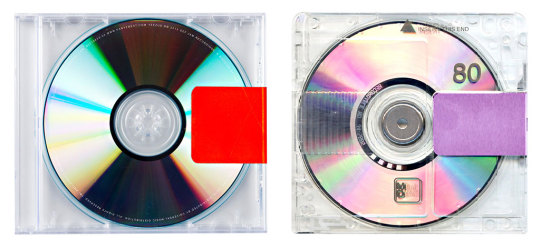
[/caption]
On the left is his 2013 masterpiece Yeezus, which unfortunately affects the style of a blank CD. To the right is its recent sequel, the not-so-great Yahndi, which makes up for its mediocrity by aping a magnificent Sony MiniDisc, a fabulous storage format that was largely outmoded by the turn of the millennium.
Don’t be fooled by the similarities, because these two things are chalk and cheese. MiniDiscs were cool. CDs are not. In addition to enclosing a rewritable magneto-optical disc inside a permanent case, giving them a more tactile quality, MiniDiscs were also smaller in the hand. And in the cinema of the mid- to late-’90s, they were a shorthand for “vaguely futuristic storage media”.
MiniDiscs played a significant role as storage for VR contraband in Kathryn Bigelow’s Strange Days (1995). Ralph Fiennes furtively stashes old VR recordings of happier times with Juliette Lewis in a shoebox of MiniDiscs, but one particular disc that comes into his possession becomes the MacGuffin in the film’s thriller plot.
[caption align="alignnone" width="980"]
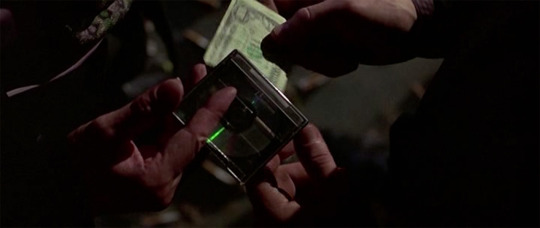
[/caption] [caption align="alignnone" width="980"]
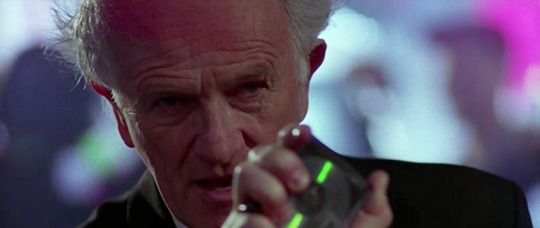
[/caption]
Gotcha: VR proof of racist police brutality… captured on disc! (See how actually compact it is in the hand?) And in the Wachowski’s The Matrix (1999), MiniDiscs return as contraband, this time stashed heavy-handedly inside Neo’s copy of Jean Baudrillard’s Simulation and Simulacra. By this time they’d become almost retro-futuristic, somehow at home with the acoustic coupler modems and Bakelite handsets.
[caption align="alignnone" width="980"]
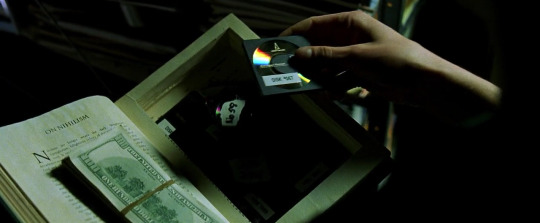
[/caption] [caption align="alignnone" width="980"]

[/caption]
There’s something reassuringly tangible about the MiniDiscs in these movies. Their secret hiding places are enticing. And the sight of these contraband objects being exchanged for physical cash is just too delicious.
In short, I wish I could be nostalgic for CDs like I am for MiniDiscs (which, truth be told, I never used that much). It’s as if MiniDiscs occupy in my imagination a subjunctive road-not-taken that would have made disposable optical media less crass. I almost feel like mad old King Denethor in Lord of the Rings, wishing that it was his less favourite son who died in battle.
🧟♀️💾 Zombie content
[caption align="alignnone" width="980"]
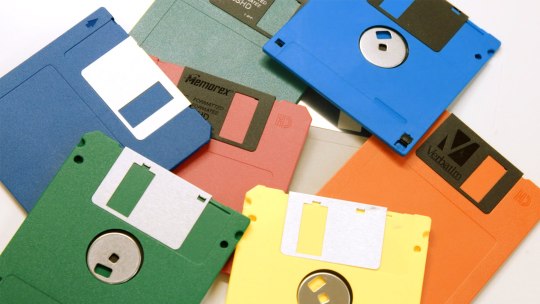
[/caption]
There are folders on my laptop that owe their structure purely to having originated on random old floppy disks that I found in the cupboard. Some of these files are unreadable, despite being Microsoft Word documents. Microsoft are amongst the most slavish followers of backwards-compatibility in the technology industry, even to the extent that they replicate the behaviour of ancient bugs in newer versions of Windows in order for apps to run smoother, but it seems that documents created in versions that predate Word 98 are lost to me. (I’ve learned my lesson: these days, everything’s in plain text Markdown.)
[caption align="alignnone" width="980"]
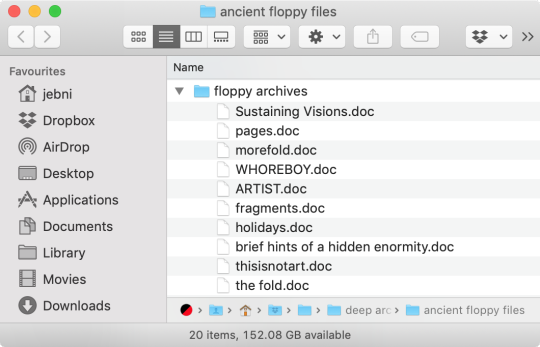
[/caption]
I’m intrigued by the file titled “WHOREBOY.doc”. From what I recall, it contained notes for a graphic novel I was planning about an undead sex-worker-of-colour in the antebellum South. A black 19th Century superhero, Whoreboy kicked arse. At least, that’s what I remember.
Update: turns out that plain text editors can glean most of the content from old binary Word files. My memory proved largely correct. Whoreboy was a runaway slave rent-boy who could sprout tentacles from his back and rise from the dead. In moments of crisis, the old slaver’s brand on his shoulder would glow, perversely triggering latent superpowers. (I’d flagged the branding of African American slaves for further research. These days I’d be in Wikipedia rabbit-hole instead.)
A snippet:
Whoreboy’s mentor, an old “witchdoctor”, mentions Jimbo in the Mirror, the terrifying folk spirit that you can only see at midnight.
“Really?” asks Whoreboy.
“No, I made it up,” he says. “Them white folk love that shit. Brown Eye for the White Guy, I call it.”
Okay, perhaps it needs more work. But think of the possibilities!
What’s the funniest skeleton in your digital closet?
🎼🔁 Refrain, with key change
It’s apparent that I often think inordinately about the past while navigating change, even if it involves a kind of “meta-nostalgia” (as above: when nostalgia doesn't seem possible, I feel “nostalgic” about “feeling nostalgic”). As I’ve said earlier,
I often look to the past when I think about the very idea of the future, not just so we can avoid repeating “the mistakes of history” (as important as that might be), but because as designers trying to make the world a better place, we really should honour the creative friction that happens when the weird fragments of the past we continue to live with rub against the potentials of the present moment. (For a future-oriented person, I do an amusing amount of hoarding! In my view, forgetting to deal with legacy systems, even if “dealing with them” involves actively destroying them, is tantamount to vapourware dreaming.)
But I’m also realising that to hover in the futurepast in the way I do means more than just coming to grips with the past, with all its traumas and potentials. I suspect that my own retrofuturistic tendencies are an instinctive way to express the bind we find ourselves in as makers of newness (designers, strategists, “change-makers”) under late capitalism: so much of our work these days seems to involve making organisations more adaptable, resilient, nimble and innovative, but how this might also be a friendly form of neoliberal shock therapy? How much is the agility of the contemporary design-led organisation a way to produce subjects who compliantly flex with the ever-shifting sands of the market?
I love to tell people about my work facilitating cultures of design possibility in organisations. After a productive co-design session, a client team-member will express joy about the concepts they’re helping to flesh out.
“You realise, don’t you,” I say, “that you’ve nominated yourself as a key part of the leadership for this project, right?”
The resulting look of terror on their face — the one that says, “B-BUT THAT’S NOT IN MY 12-MONTH WORK PLAN!” — is one that I always relished. And so I drag them kicking and screaming into the future. While I’m not about to defend calcified organisational cultures of bureaucratic planning, I’m now a bit more equivocal; I can see some continuity between my own gleefulness and the forces that are casualising workforces around the planet.
Perhaps my hovering, with my face turned to the past as I explore futurity (and like Lot’s wife as she looks back at Sodom even as she flees), is an admission that security and belonging are worth something in these times. So as we experience the churn of obsolescence and innovation, let’s keep our wits, sympathies and sense of revolt about us.
A sustainable portion of all my love,
Ben
0 notes